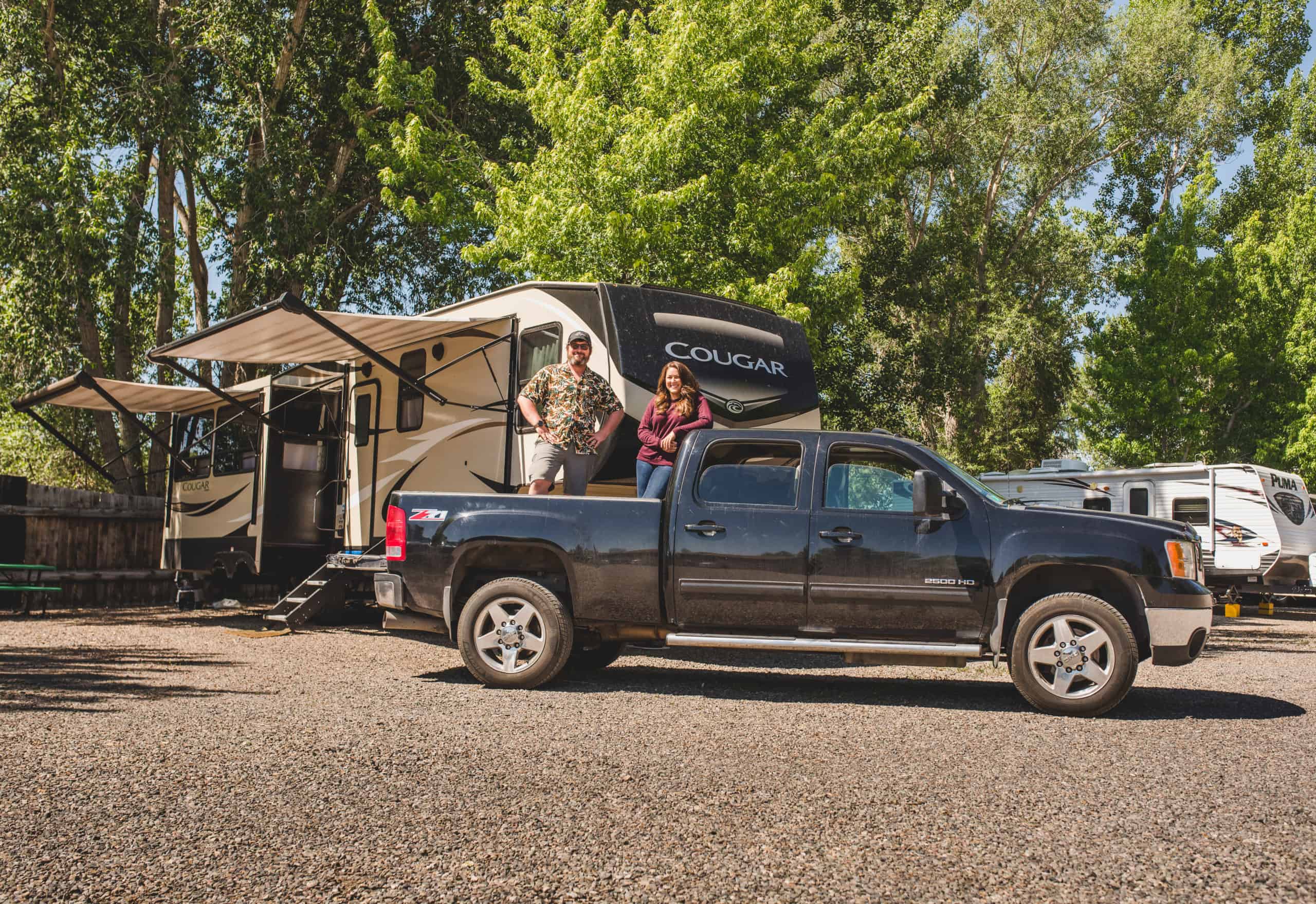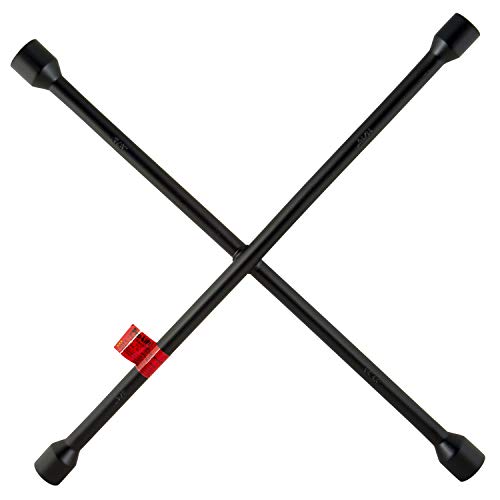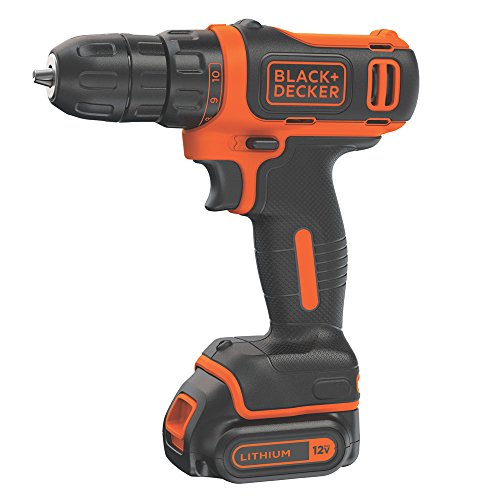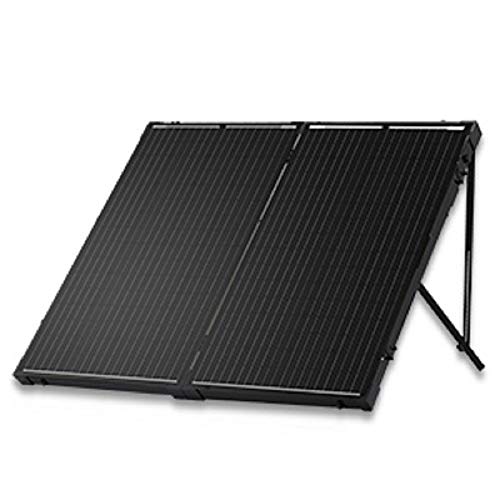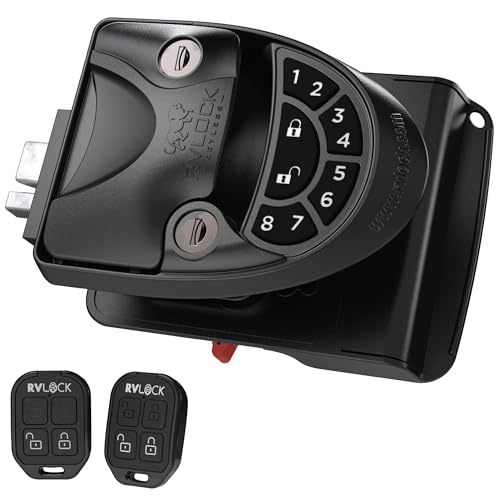Last updated on June 26th, 2025 at 07:57 am

Living in an RV full-time is a lifestyle that many people find attractive. It can appeal to anyone who wants the ultimate freedom of traveling on their own schedule, and it’s also perfect for those who want to live simply and with less clutter.
Hi there! I’m Cindy! From 2018 to 2021, my husband Barrett and I sold most of our belongings, stored a few precious things, and embarked on our very own full-time RV life adventure! During that time, we lived in 31 US states and put over 20,000 miles on our rig. We also learned a ton about what it takes to live this way.
If you’re considering taking the RV life plunge yourself, I know from first-hand experience that there are many questions you will have.
Don’t worry, though! I’m here to answer all those questions, including everything from common misconceptions (yes, we still get mail and have an address!) to things like, “How do you guys live with pets on the road?”
This article is intended to provide you with loads of beginner RV life tips and tricks we’ve discovered along the way!
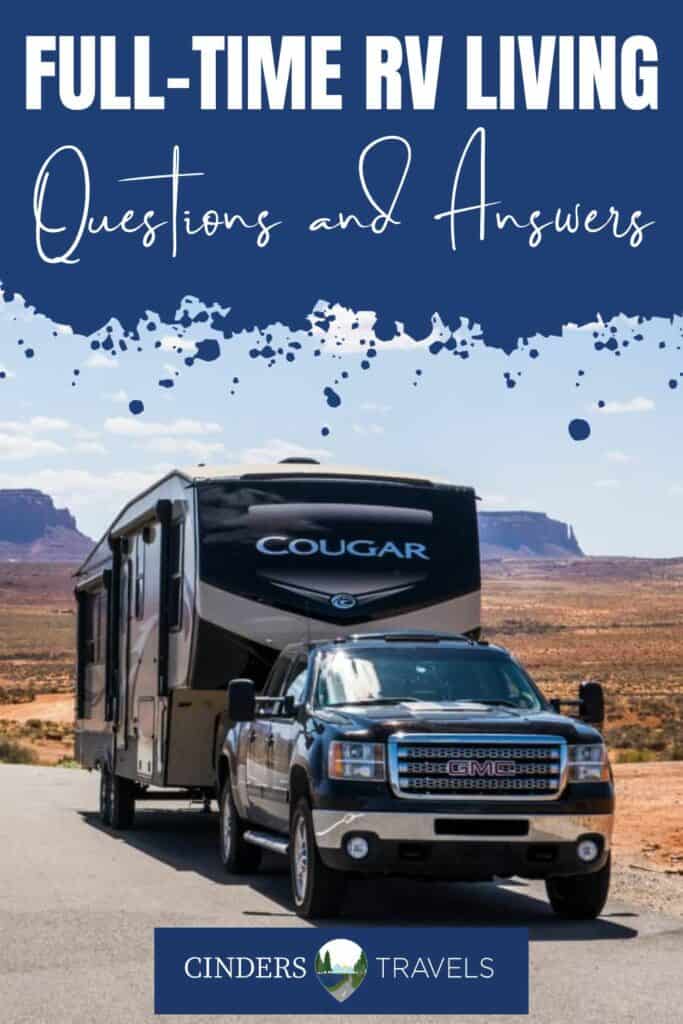
Introduction to Full-Time RV Life
1. Can you live in an RV full-time?
Yes! You absolutely can live in an RV full-time!
My husband and I lived out of our fifth wheel full-time, with pets in tow, for three years.
When we started our journey, we were RV newbies! We had no idea what we were doing.
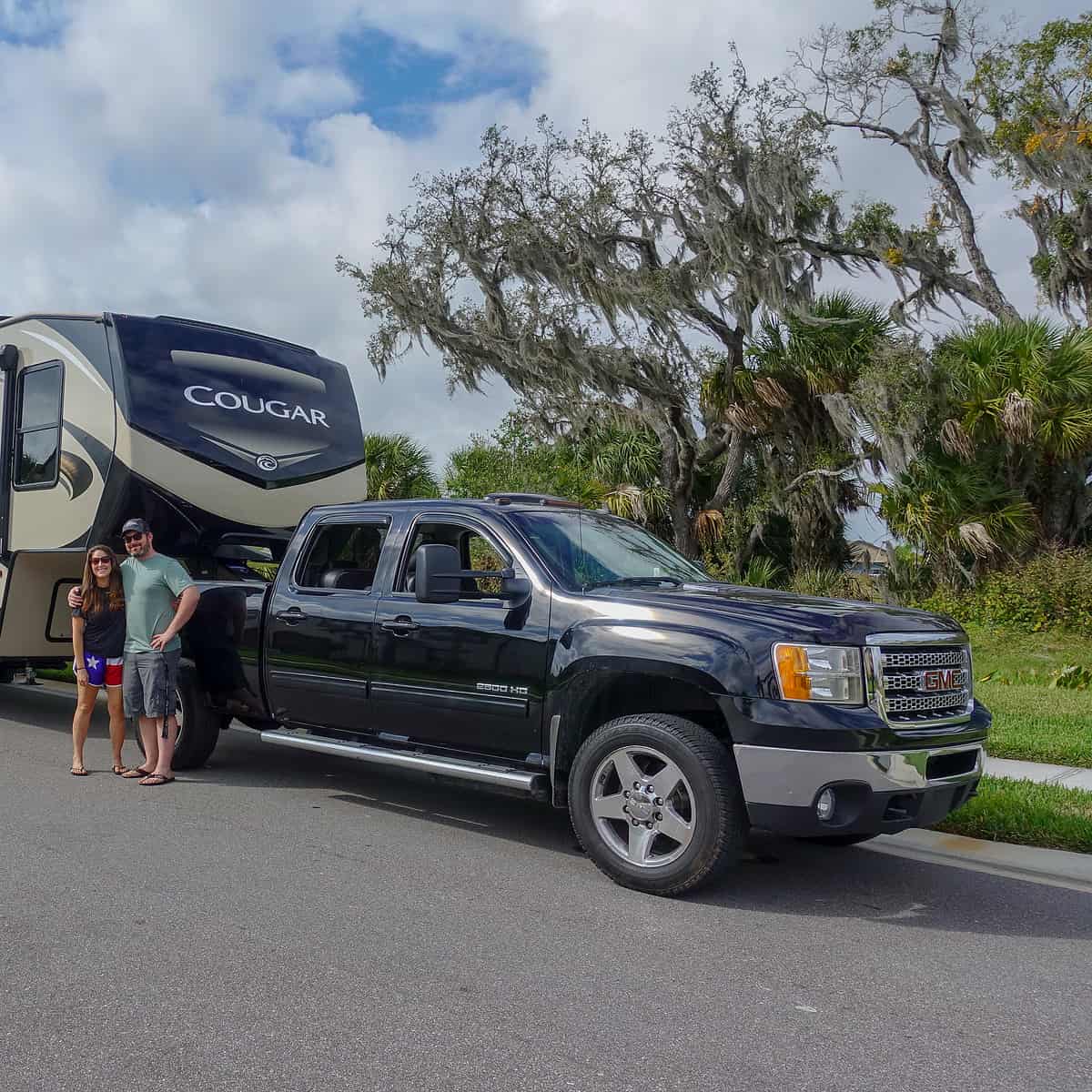
Living in an RV year-round was an incredible learning experience, from finding ways to stay connected via Wi-Fi to figuring out how to best stay connected to power, dealing with breakdowns while still managing work and school, and caring for our four-legged family members. All these experiences are just part of daily life as someone who lives their dream every day by living in an RV!
If you’re asking if it’s legal, yes, of course! However, you do have to be responsible about where you park your RV. Know the business rules or local laws affecting the area you want to park your RV if you’re not planning on staying in a campground, RV park, or boondocking on BLM land.
2. How do you live in an RV full-time, and what is living in a camper like?
The simple answer, we just did!
Living in a camper full-time may seem odd to many. Still, I was surprised to learn that, space-wise, living in an RV full-time is really not that different from living in a small apartment. (But this apartment rolls and can accompany us on all our adventures!)
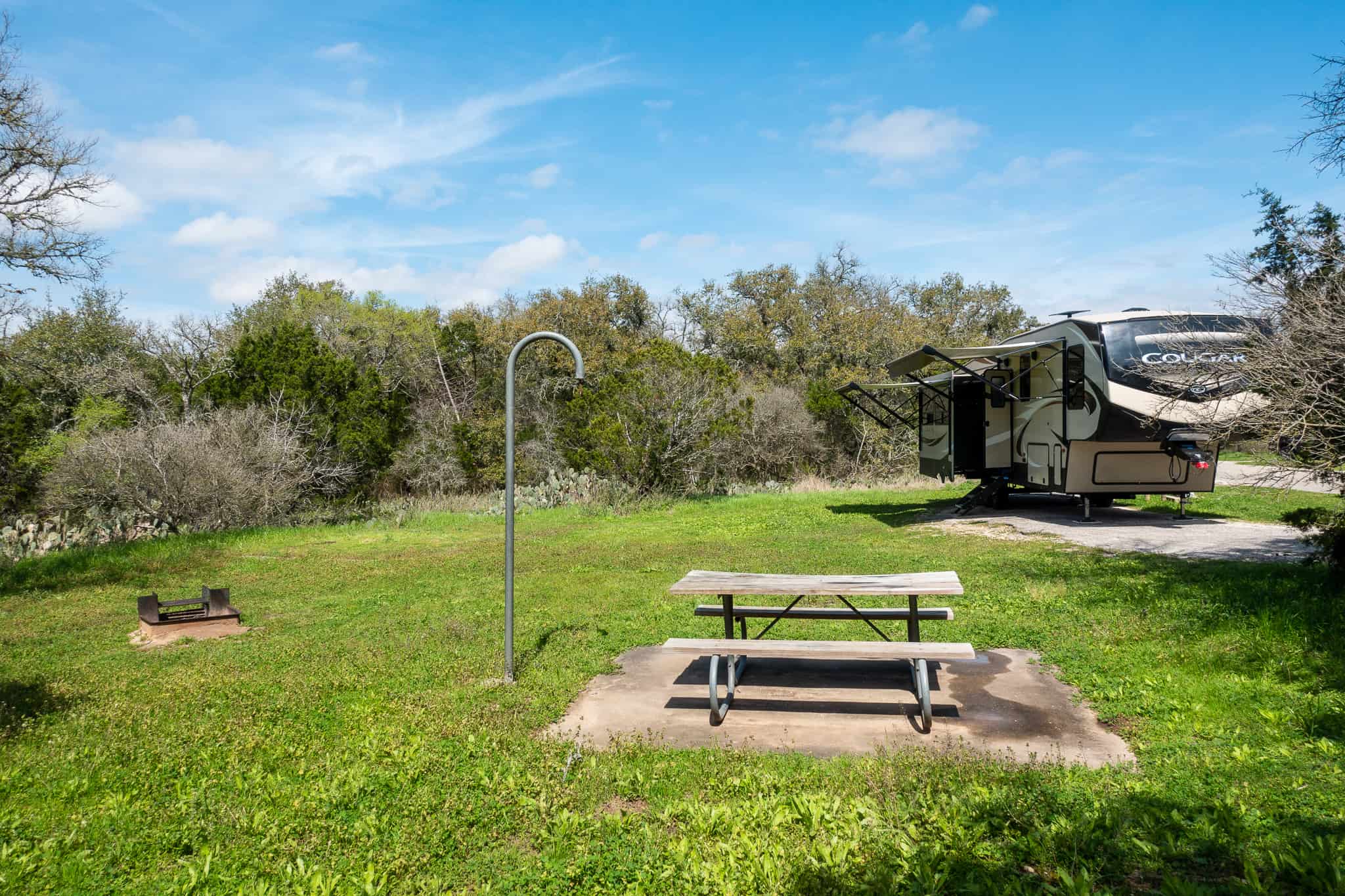
Don’t get me wrong, life is different in an RV. No matter how much manufacturers make them look like brick-and-mortar homes, they come with their own set of unique limitations different from those in a house – including heating, cooling, and electrical quirks. If you are new to RVs, there will be a bit of a learning curve.
We had to learn new techniques for obtaining and living with power, water, propane, and sewage. But for us, it’s been a small tradeoff for a life of adventure on the road.
I also spent a lot more time feeling like a full-time tour director. I frequently spent my free time figuring out where we would stay next and what we wanted to be sure to experience while we were there.
3. Why are you living in an RV full-time?
A lot of people ask us why we did this whole RV life thing. And while in our 30s, with pets, jobs, and school on top of it all… Are we okay?
I had always wanted to experience living in an RV. Living on the go while exploring new places around America sounded like an incredible adventure.
Barrett and I both grew up camping, so years before taking off, I would slyly slip how cool it would be into conversations here or there with my husband.
At the same time, I started slowly obtaining more clients outside of my typical media jobs and learning how we could work from anywhere and go to school from anywhere.
One day, my husband came home from his typical 9-5 job, having decided it was time for a change. Everything ramped up pretty quickly from there. We first bought the fifth wheel, then our first diesel truck.
Initially, we told ourselves that our goal was to find the perfect place to settle down. But along the way, we also fell in love with the adventure of seeing this great nation.
Sometimes, our perfect home search took a back seat in exchange for visiting National Parks and other “shiny objects” along the way.
But every place we visited, we asked ourselves what we liked (and disliked) about it, asking ourselves if we could see ourselves living there. So, we were getting a bit closer in our hunt every day!
Until we discover it, we’re going to have as much fun as possible exploring every lake, trail, and town we can find across America!
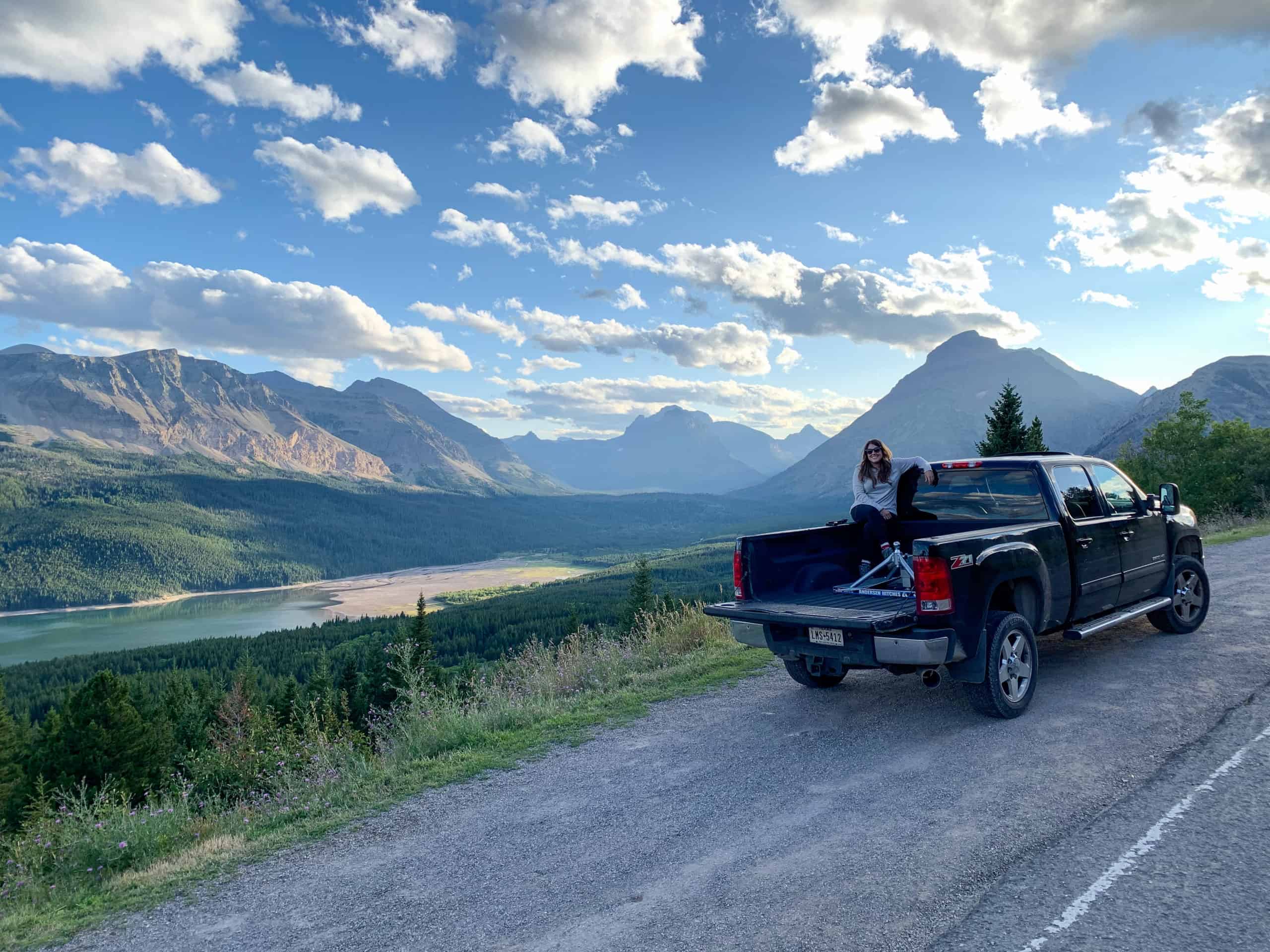
Preparing for Full-Time RV Life
4. What was involved when downsizing to live in an RV full-time?
One year, we quit our office jobs in August, married in September, and were on the road by November. So, we spent the first three years of our married life in our RV.
Between the wedding and taking off on the road, we purged a LOT of things. I would guess it was 85-90% of everything we owned, including cars, kayaks, and furniture. Someone from Facebook Marketplace or Craigslist was at our door multiple times daily.
We tackled this process room by room and placed everything into four piles: Sell, Return, Store, and Donate.
I also found Marie Kondo’s book “The Life-Changing Magic of Tidying” super helpful during this part of the process.
- Marie Kondo (Author)
It’s so easy to become attached to our stuff! Purging your things can be an emotionally draining process. Take the necessary time during this stage, and be kind to yourself.
5. Did you store anything before taking off?
We rented a 10×15 storage unit to hold the sentimental items we couldn’t part with.
We stopped at it at least three times on the road to add a few things we found along the way that we just didn’t have room for, as well as the stuff we had in the RV that we thought we needed but didn’t.
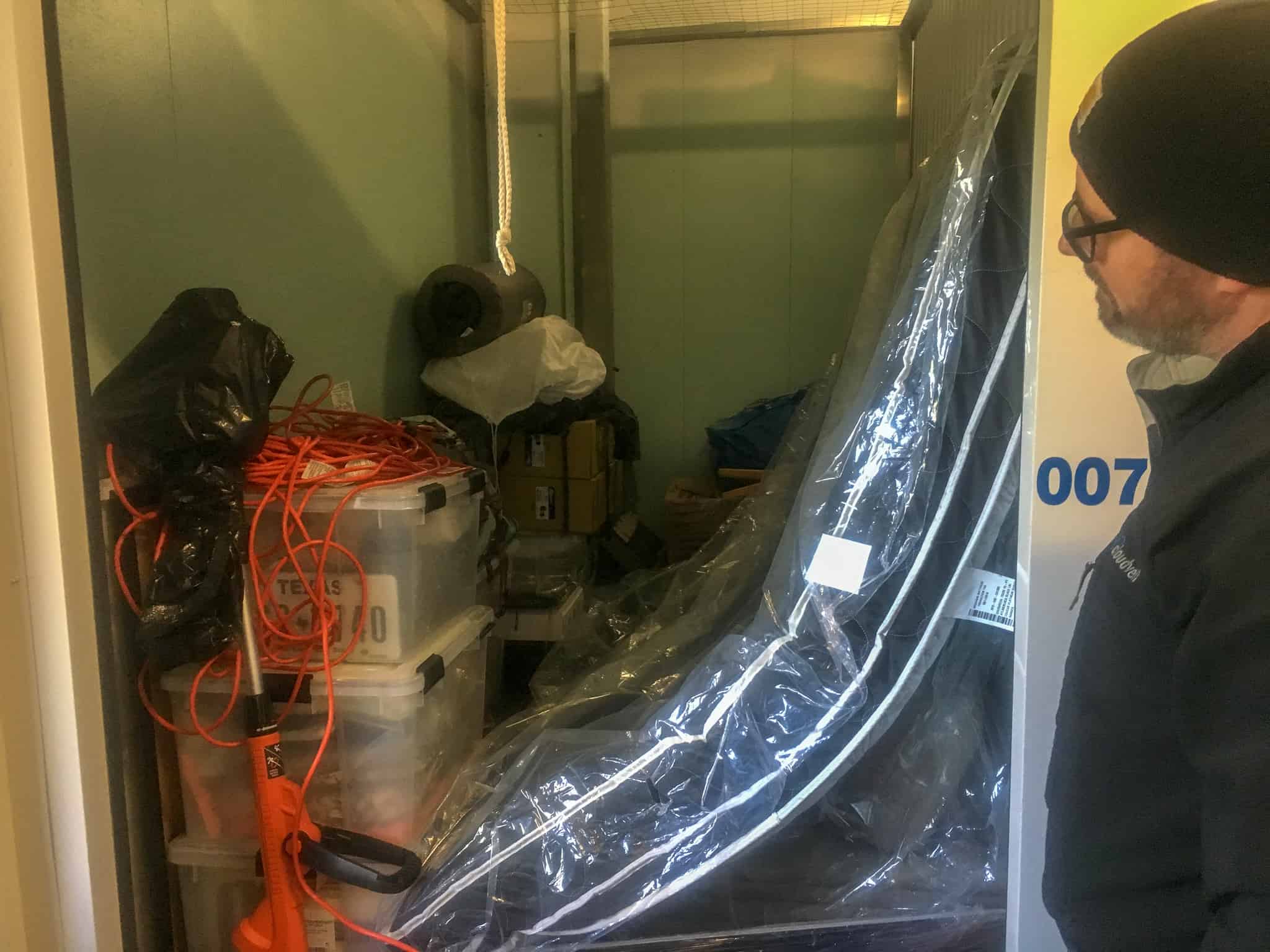
6. How did you prepare for living in an RV full-time?
When we started out, we knew very little. We’d been reading books and blogs and getting as prepared as possible. We were campers, but we had no hands-on RV experience except for a few camping trips in a Roadtrek for me and a few in a pop-up camper for Barrett.
We started by listing everything we needed to do before taking off on the road on a huge whiteboard in our house. Eventually, we realized everything on that board could be categorized into 8 main focus points.
I’ve consolidated those 8 points in a free downloadable PDF you can get here!
(Or down here 👇)
7. Did you do any practice runs?
We did not do any practice runs. We opted for learning as we went.
At the time of purchase, our amazing Camping World saleswoman Susan recommended we take the RV on a few trips before living out of it. However, we were in Pittsburgh, winter was closing in on us, and we were anxious to get on the road.
So, we opted to learn as we went. The first few months were nothing short of an RV education, full of wins and defeats, but everything worked out. And we even managed to become better partners and campers along the way!
That being said, these days, I lean toward the “test runs would have been helpful” side.
Also, doing practice runs with companies like RVshare for rentals is easier now. We would have learned some basics, like knowing when to refill the propane tanks and a few shore power best practices with trial runs.
👉 Click here to book a test run getaway with RVshare.
Remember, it gets easier as you go, so if you feel intimidated by that first rental, don’t let it stop you from trying it several times.
8. Do you need to know how to work on RVs to live in one?
The short answer is no. Much like cars and homes, you can find mechanics.
The longer answer, though, is they’re not always as easy to find. And if you’re going to rely on mechanics, you definitely need to make sure you’ve accounted for that in your budget.
Constantly taking an RV down the road takes a toll on them.
Getting comfortable with the concept that they are fragile is super important. They are not built like a home. That way, when things start falling apart, you won’t stress as much as we did initially about things that were entirely out of our control.
Still, it definitely doesn’t hurt to know some basics or at least go into the mindset of figuring you’ll learn along the way. Things breaking is 100% part of the lifestyle. The sooner you realize that the sooner you’ll start enjoying the journey more.
We have found it very helpful to have these tools in our toolkit:
- 4 Unique socket sizes: 11/16 inches, 3/4 inches, 13/16 inches, 7/8 inches. With 6 point socket head, it ensures to fit well on hex-shaped lug nuts
- Durable Ratchet Head: Made from Hardened treated Chrome Vanadium steel alloy (Cr-V) Corrosion-Retardant: Satin Finish. Made in Taiwan
⚙️ Power Drill
- Keyless chuck for quick and easy bit changes
- AUTOMATIC LOCK - Self locking mechanism allows blade to lock automatically and retract at the push of a button.
⚙️ Screwdrivers of Varying Sizes and Lengths
- 【MULTI-PURPOSE USE】: Top quality magnetic screwdriver set, 10 professional grade screwdrivers that are designed to serve a multitude of uses.
- Inflates tires from 80 PSI to 90 PSI in less than 44 seconds
9. How did you choose where to establish your domicile while full-time RVing?
If you’re wondering what a domicile is, it’s known as the spot you “intend to call home.” This will be the state your driver’s license is registered in, where you vote, where your health insurance will be based and more than likely cover you (more on that below), where your vehicle is registered, and the state you file taxes.
Texas, South Dakota, and Florida are the three most popular states for full-timers to choose as their domiciles. This is because those states offer superior financial savings options.
We were established then with a Texas domicile, but not just because of the financial benefits. (Financial savings should not be the only reason you pick a specific state as your domicile. If you’re trying to decide where it would be best to be domiciled as an RVer, you must consider where you see yourself returning to regularly.)
We met in Texas, spent many years there, and even own a home there. Texas is also where our health insurance, financial advisor, doctors, dentist, etc., are based. For us, Texas made more sense than any other state. At the time, we had the closest semblance of a past life and home in Texas.
Establishing a domicile in Texas was simple. Multiple companies can help you with this. We went with Escapees.
So, despite not knowing where we wanted to live when RV life was over, Texas was an easy choice for us. We had reasons to return to the state as needed.
👉 Thinking about joining Escapees RV Club? It’s packed with helpful resources, discounts, and a strong RVing community. Use promo code CINDERS20 at checkout to save 20% on your membership!
10. If you live in an RV, what is your address?
Once we established a domicile in Texas with Escapees, they gave us a domicile address.
11. How do you get mail to the RV?
Getting mail can be a tricky game.
Since we have renters who live in our Texas home, we receive all of our mail at the domicile address we set up with Escapees.
All of our mail piles up at Escapees HQ and is then delivered to us whenever we request it, wherever we are!
We tend to go with the once-a-month approach, and it looks a lot like this when it arrives:
We also try to receive as much of our mail digitally as possible these days so we don’t miss important deadlines.
As for packages, we either attempt to deliver them to the appropriate campground/RV park on the right day or, if the place we are staying doesn’t allow mail, to the closest Post Office as a General Delivery package.
A few extra things that were different about mail in the RV: We had a “mail budget” because we had to pay Escapees to forward our mail. On top of that, it took us longer to receive things, so it was not rare for us to re-direct packages that didn’t arrive at our destination while we were there.
Buying an RV to Live in Full-Time
12. What is the BEST RV for full-time RVing?
There are a ton of ways to tackle this lifestyle.
We’ve seen full-timers living out of every type of RV out there! The sky’s the limit!
The best for you will be the one that gives you the space and amenities you believe you require while living on the road while also fitting your budget.
I’m partial to fifth wheels because of their robust build, layout, and space. But for some people, they will be too big. Or maybe you don’t want a truck. Perhaps you’d rather have a motorhome and tow a smaller, more affordable car with better gas mileage. You can read more about how to buy the right RV for the RV lifestyle you want here.
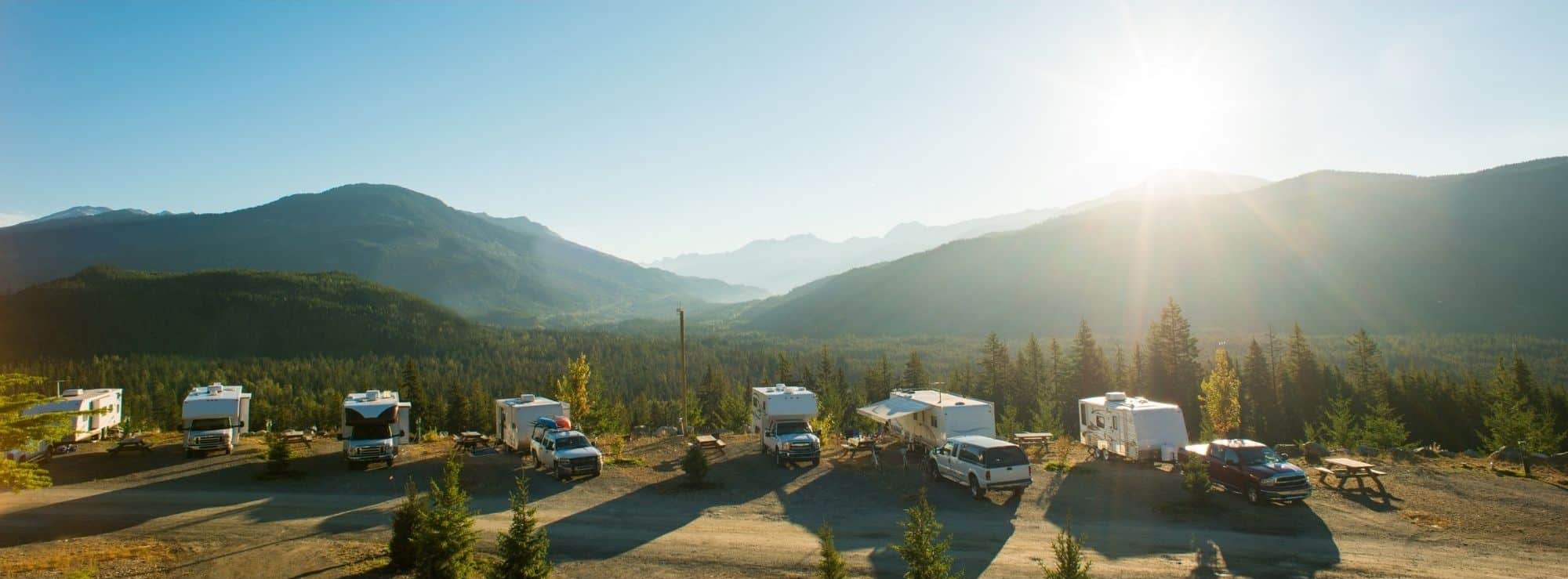
13. Why did you choose to live out of a fifth wheel RV specifically? And how did you know that was the right type of RV for you?
A lot of research!
We started out being interested in travel trailers, but after some conversations with people who build trailers used on movie sets, we felt more secure about the superior construction and the added travel stability provided by fifth wheels.
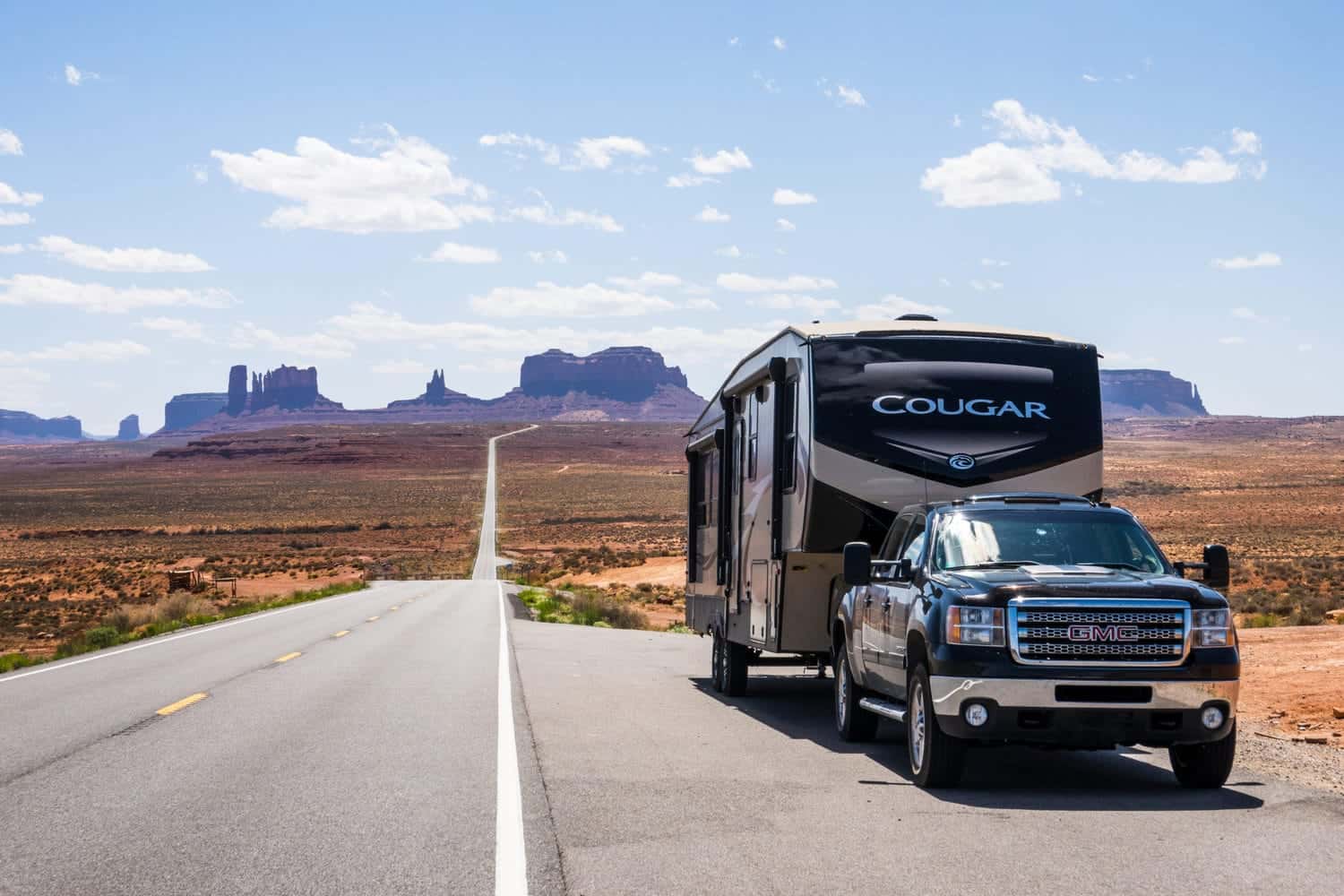
When deciding which type would be best for you, first ask yourself what you need in these three areas: lifestyle amenities, layout/floor plan, and length.
Lifestyle Amenities
Do you only need the basics? If so, a pop-up trailer, van, or Class B vehicle could work just fine.
Are you the type who wants to return from a day of outdoor adventure to a rig that feels “homey?” Then, it would be best to look more into Class As, Cs, fifth wheels, travel trailers, or toy haulers.
Furthermore, if you plan on mostly staying in campgrounds or RV parks with power, any of those options above should work just fine. However, if you intend on boondocking often, you will need to consider the size of the rig’s holding tanks and off-grid electrical setup.
Layout / Floor Plan
What kind of floor plan do you prefer? To figure this out, ask yourself how you plan to use your RV.
If you intend to live in it full-time, what would be most important in the kitchen or bathroom areas? How much separation do you want between your living and sleeping areas, if any? Would you like to have a lot of counter space?
We wanted the feeling of separate zones. Moreover, we knew we needed a unit with a rear living area that could be easily converted into an office.
We fell in love with our rig because of the layout.
We liked that the bedroom and bathroom were separated from the kitchen and dining area, as well as the living room and office. We could have spots to work, relax, cook, and sleep. And, for the most part, none of them would interfere with each other.
More than that, a lot of countertop space was essential for us. Barrett intended to do a lot of cooking, so the kitchen island and three countertops in our rig were another big part of why we fell in love with it.
Make sure to take the time to consider what layout would work best for you.
Length
It took a lot of work for us initially to agree on the length of our rig. My husband wanted something new, short, and small, while I wanted something old and huge.
The good news is that after you’ve decided on lifestyle and layout, you’ll probably start to have a narrow range of lengths that will fit your needs.
Something to contemplate in this topic is whether you want to stay at many national parks. If so, you may want to choose a shorter RV because many of the bigger rigs can’t camp in the national parks (see a list of size restrictions here).
But, if you’re okay with staying outside of parks a bit and then driving in, as we often do, then the longer-length rigs will work just fine.
Also, ask yourself what length you’re comfortable driving. I firmly believe that pretty much anyone can get used to anything, but this is not the case for everyone. If a long rig scares you and you don’t see that changing, then that’s something you need to consider.
Consider Attending an RV Show
Ultimately, the best recommendation I can give for figuring out what RV would suit you is to step away from the computer and visit an RV show or dealer.
Early in our search, we went to a big RV show in Tampa and spent an entire day walking in and out of hundreds of models. We’d sit in them and ask ourselves if we could really picture living out of each type.
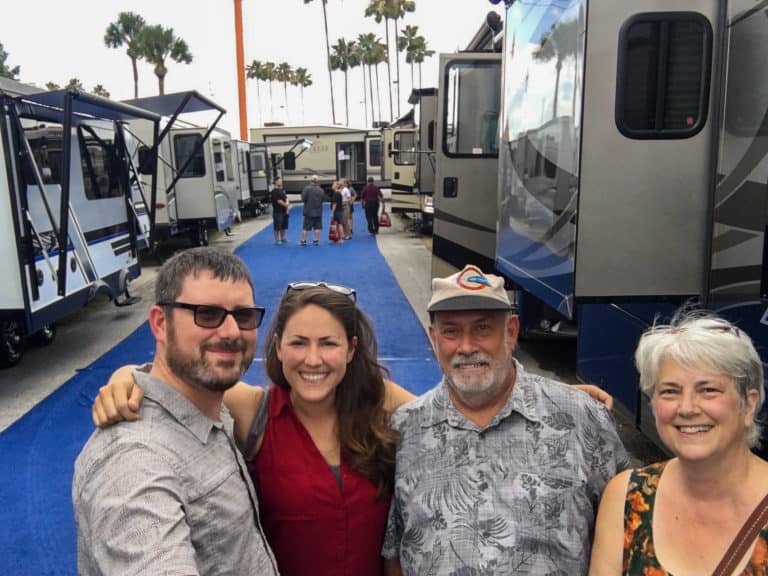
You may think you know everything, but it may surprise you how much you can learn from moving around in a bunch of different models. Sitting in them really helped us narrow our search down.
Consider Renting an RV
If you need help picking which RV is best for you, try a rental!
At this point, I’m convinced that testing out a rental RV would have been even better than attending the RV show.
RVs are expensive, depreciating assets. Renting a few different types allows you to figure out what layout, amount of space, and rig style would best suit you before making a more substantial commitment.
👉 Read all about the additional benefits of renting before buying an RV here.
14. How did you go about buying an RV for the first time?
Buying the RV felt extremely overwhelming to us in the beginning. Where do you even start?!
As I explained above, we always tell anyone who asks us to spend time at RV shows. Stepping in and out of countless different types of RVs and speaking to representatives who know all about RVs was incredibly helpful for us when we were just starting out.
Sit in as many different types of RVs as you can handle. Ask yourself what amount of space and what layouts will work best for you and your family.
Once we knew we wanted a fifth wheel and a Cougar, we went to Camping World to look at some and found the perfect one on the first visit to the lot!
We had planned on buying a used model, but the version we loved was a brand new style, and no used versions existed yet. We tried finding a comparable used one, but no other layout was quite right.
Being the budget-oriented person I am, I was having a hard time accepting we would be taking the initial financial hit on a depreciating asset. Still, ultimately, we couldn’t stop thinking about that specific fifth wheel. We were in love with it!
So we returned to Camping World, bought it with no regrets, and never looked back.
👉 I shared some additional tips for making your RV purchase here, including five questions you should ask yourself beforehand and three you should consider once you’re in the purchasing stage.
Planning RV Routes & Finding Spots to Stay while Full-Time RVing
15. What apps and websites do you use to plan your RV trips? And how do you find a good spot to stay?
Our process goes something like this: We decide where we want to go next, and then I start researching!
After two-plus years of using a few different options, including a Garmin RV GPS, we’ve picked RV Trip Wizard as our favorite app for RV road trip planning and mapping.
I recommend using an RV-specific planner instead of an app such as Google Maps because, unlike a typical maps app, one like this will keep your height, length, and weight restrictions in mind.
I’ve chosen RV Trip Wizard as my favorite because I enjoy the program’s comprehensiveness.
You’ll enter your RV specifications, driving preferences, and fuel economy information when using the app. It then creates the optimal path for you and your rig. Once a path is created, you can look at RV parks, campgrounds, and points of interest along the route in the app and create a list of all your favorites.
However, I don’t stop there. No RV park/campground database has everything you need to know. Many factors must be considered when picking a spot to stay, including your desired budget, proximity to a town, amenities, comfort level, and rig size.
If you work from home (or just enjoy watching Netflix in the evenings), you’ll want to check out the cell signal at each park you’re considering on Campground Reviews and Campendium.
If we’re feeling up for an adventure or if we need to save some money, I use Boondockers Welcome to find boondocking options nearby.
🚐 Want to try Boondockers Welcome and Harvest Hosts? They’re now part of the same membership — giving you even more unique, budget-friendly places to stay. Use promo code CINDERS20 at checkout to save 20%!
Then, to ensure I didn’t miss anything, I do a quick search on Google, Thousand Trails, Good Sam, The Dyrt, Hipcamp, AllStays, and RV Parky for possible spots as well.
The best advice I can give anyone trying to book an RV stay is to be flexible and open to changing their plans. If you can do that, you’ll be sure to find an RV park, campground, or boondocking spot that works just fine.
Check out these articles for more advice on how to pick the best RV park or campground:
👉 How to Choose a Campground That’s Perfect for Your Next Adventure
👉 Create the Ultimate Camping Plan: Step-by-Step for RV, Tent or Trail
👉 14 of the Best RV Parks in North America According to 9 Lady RVers
👉 11 Best Lakeside Campgrounds According to 2 Full-Time RVers
16. Where do you stay?
We stay at a mix of campgrounds, RV parks, boondocking spots, and, occasionally, a Cracker Barrel.
There are pros and cons to each type of spot. If I’m going to attempt to boil it down to a real simple difference, here they are, but keep in mind these are not always the case:
RV Parks: The most amenities, the most expensive.
If you’re looking for luxury, check out RV parks. These destinations generally target those who prefer to make their camping stay as comfortable and easy-going as possible.
With amenities such as basketball courts, ice cream stands, and a hot tub to soak in at the end of your long day’s adventures, these parks provide many activities that will keep everyone entertained!
Two popular examples are KOA and Jellystone Park.
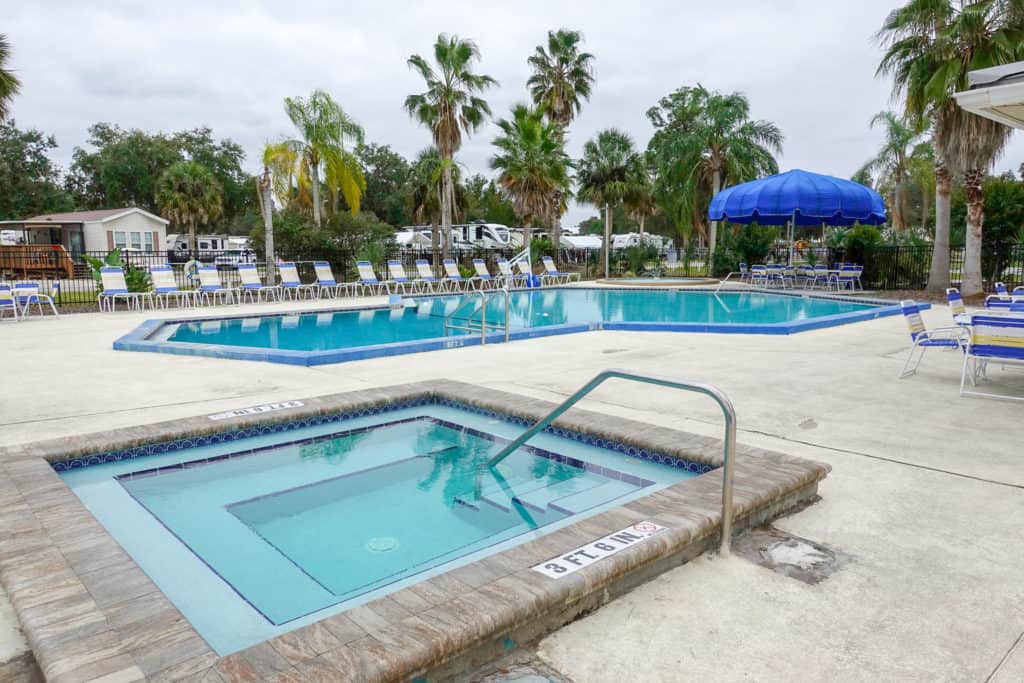
Campgrounds: fewer amenities, often more beautiful and secluded, and usually cheaper.
These spots are the best when you want the vast natural world to surround you and nothing but peace and quiet while disconnecting entirely within nature. However, living “rough” in a campground with your RV means you don’t have to completely rough it!
If seeing some animals is what you’re looking for, then campgrounds can be the best option.
These spots rarely have amenities. Furthermore, national park campsites are highly coveted because they are in the heart of the action and tend to be the most peaceful.
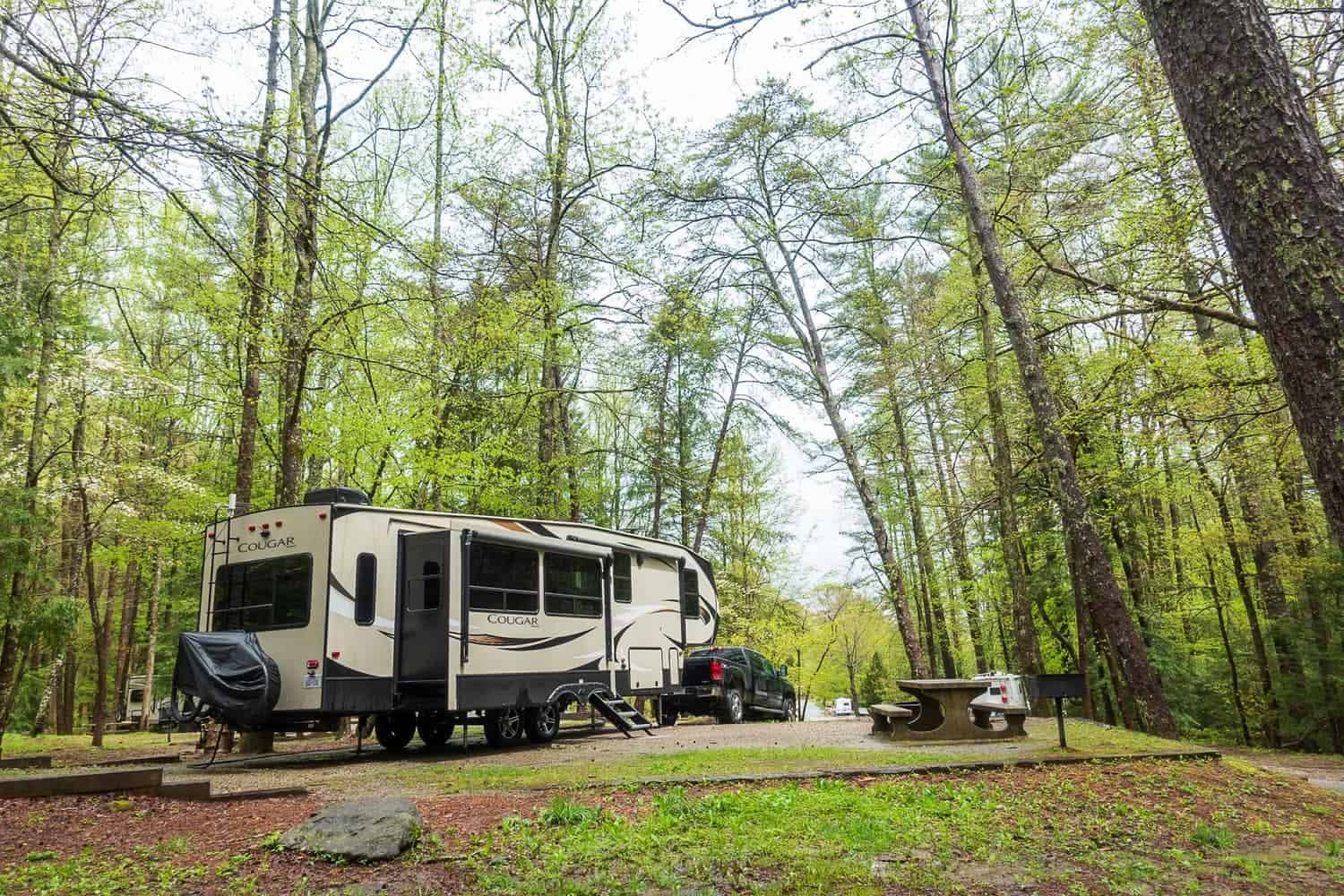
Boondocking: Free camping on public lands! There are no amenities or hookups.
These spots are found in national and state parks, forests, wilderness areas, and BLM land. Campendium and Boondockers Welcome are helpful resources for this method of camping.
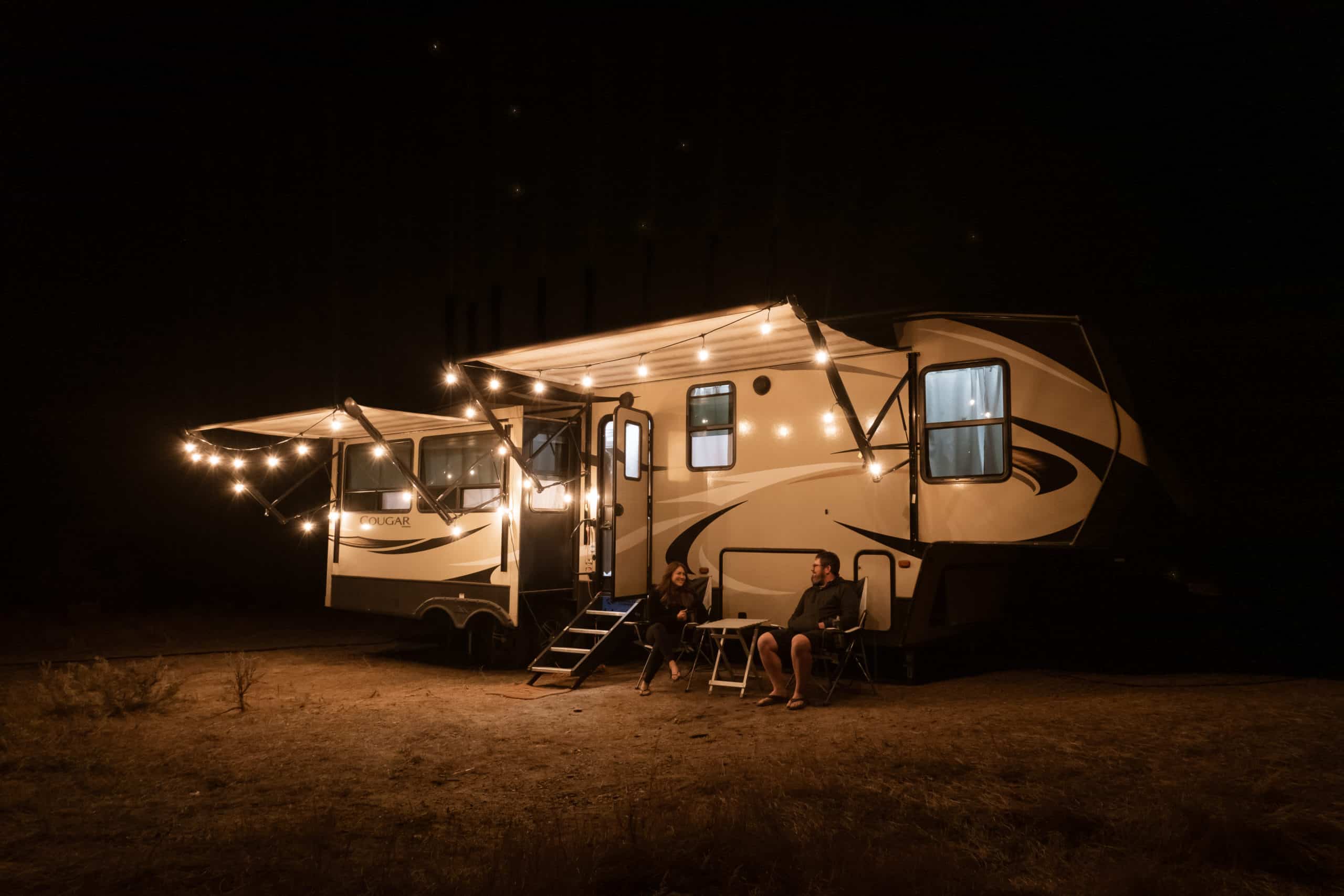
Cracker Barrel: Free dry camping (Although it’s recommended to get dinner that night or breakfast the following morning as a “thanks for letting us stay!”). There are no amenities or hookups. You are in an RV parking spot for the night.
When in need of a quick overnight stopover, we tend to prefer to stop at Cracker Barrels over Walmarts for a few reasons:
✅ They are generally not as creepy. Not all Walmarts are concerning, but some are. We have yet to find a creepy Cracker Barrel.
✅ They are often right off the interstate, making it an easier stop for the night.
✅ You get to wake up and start your day with a hearty meal directly outside your front door!
Just make sure you call ahead and ask each specific location if staying the night is okay. We have yet to find a site that says no.
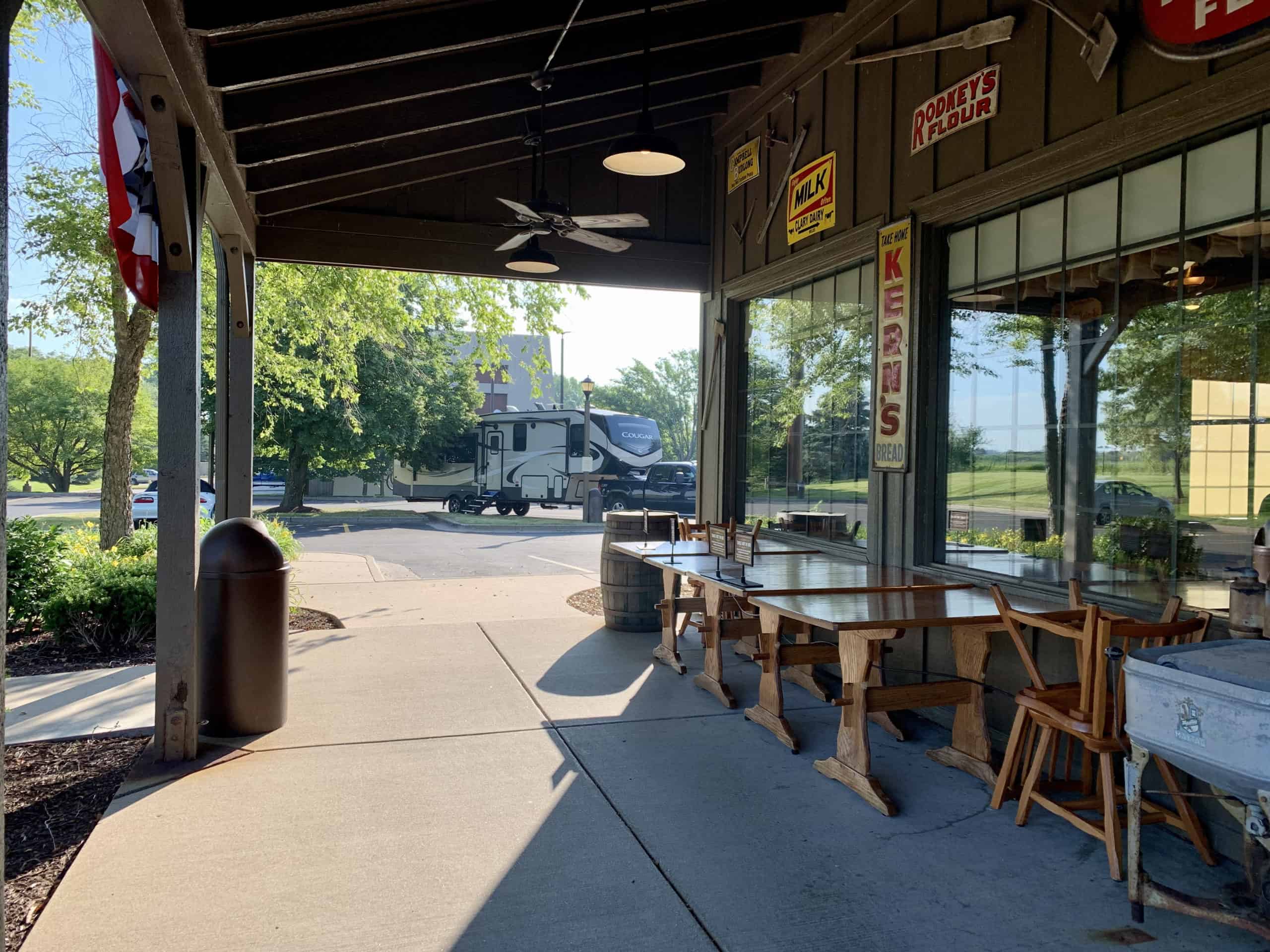
We’ve reviewed some of the RV parks and campgrounds we’ve stayed at. The reviews can be found here.
We’ve also listed every spot we’ve ever stayed here.
Lastly, check out the Locals Know Best Podcast for tips on outdoorsy destinations to visit all over the United States!
17. How do you know if each RV park or campground will be safe or worth a stay?
Great question! Always look at reviews before showing up.
The review resources we have used the most dependably on the road have been Google, Campground Reviews, and Campendium. These resources collectively will give you a clear picture of what kind of place you are headed to.
If you ever feel unsafe in a spot, I recommend leaving. There are always more options.
The Financials of Full-Time RV Life
18. How much does it usually cost to stay overnight in an RV park or campground?
RV Parks: On average, in our experience, $30-$60/night. However, RV Parks often offer weekly or monthly discounts if you intend to stay a while.
Campgrounds: On average, in our experience, $15-$40/night. Campgrounds rarely offer weekly or monthly discounts, and it is common to have to leave after two weeks. Additionally, sometimes, there are state or county park fees in addition to the campsite fee.
Boondocking: Free!
Cracker Barrel: Free, but purchasing a meal is recommended.
19. What are the best memberships available to full-time RVers? And are they worthwhile for full-time RVers?
They can be!
Thousand Trails is the membership we got the most mileage out of while full-time RVing. It offers “free stays” at resort-style RV parks with a wide range of amenities.
With Thousand Trails, you pay an upfront membership fee and monthly fees to be in the system. After all the upfront costs, we found that our “free” nights equated to about $35/night, which is still cheaper than booking a spot without a membership at these parks.
So it’s worked out nicely for us, especially when we’re seeing family in Florida, where they have many locations close to my parents!
👀 Look into Thousand Trails and see if they have locations in areas you intend on frequenting. Use this link for $100 off a Thousand Trails Camping Pass!
Other membership programs worth looking into include Passport America and Harvest Hosts.
🎉 Ready to try Harvest Hosts and stay at unique destinations, like alpaca farms, wineries, and museums, for free? Use code CINDERS20 to save 20% when you sign up!
20. What are the costs associated with full-time RV living?
RV spot fees: When hitting the road, we established we would be okay with our RV spot spending being similar to what we used to pay monthly on our mortgage. I am happy to report that, on average, we spend about 65% of our monthly brick-and-mortar mortgage costs.
We have been able to park in some of the most beautiful spots the US offers at a fraction of what it would cost us to put down roots there. In the RV, we wake up surrounded by stunning scenery and waterfront views for a daily rate much cheaper than any of the small apartments I ever had in Austin, New York, or Los Angeles. And then, once we are ready for something new, we can merely pick up and leave!
Diesel: While full-time RVing we spent $388/month on diesel on average.
Propane: From November 2018 until August 2020, we spent approximately $18/month. From September 2020 onwards, our monthly average has jumped to $36/month.
There are three reasons for this. First, we were in colder climates this past winter. We also started cooking more meals at home and eating out less. Lastly, we have a refrigerator problem: It constantly blows fuses and switches to run on propane.
We paid for no other utilities, so dragging our feet on assessing the fuse problem was an acceptable compromise at the time.
RV Repair Finances: Since hitting the road, we have paid an average of $91.13/month in RV maintenance. This includes all projects we’ve done inside the RV, such as ripping out all our carpet and replacing it with flooring.
RV Payment: Our RV has been paid off with investments and savings. No payment here.
Truck Repair Finances: This is a sadder story. $479.90/month while we had the 2014 GMC truck. $108.99/month since having the 2020 Ford truck.
Truck Payment: Since August 2020, our truck payment has been the most expensive cost we have on the road. Purchasing the new truck has essentially tripled the payment we were initially paying.
However, not being in the shop every few weeks, not fearing our vehicle could fall apart at any second, and not regularly dealing with horrible customer support anymore (And across the US … for real … don’t get me started on the terrible culture that is festering inside of every GMC we entered. And we were in A LOT.) has been worth every penny.
Boondocking Supplies: If you want to boondock frequently, you’ll likely need to invest in solar panels and/or a generator to keep your rig running. Remember, though, that the investment will balance out over time since boondocking spots are free!
I would compare these numbers to the current monthly budget for your rent/mortgage, home utilities, gas, vehicles, and repairs.
Everything else in our budget stayed similar or decreased dramatically compared to before hitting the road!
We definitely buy fewer things. We don’t need much more than what we already have on the road, and we also don’t have room for anything else! Our extra spending is almost entirely on food or experiences instead of things.
21. What does a full-time RV living budget look like?
Honestly, you can make everything listed above more affordable or more expensive. You can find ways to make the full-time RVing lifestyle fit almost any budget. Think about everything listed above when forming your own.
One thing I will say, though, is that it’s wise to hit the road with an emergency budget. If you didn’t notice above, trucks and RVs break when you’re moving a lot, and that’s true whether they’re old or new!
I’d recommend having a security blanket.
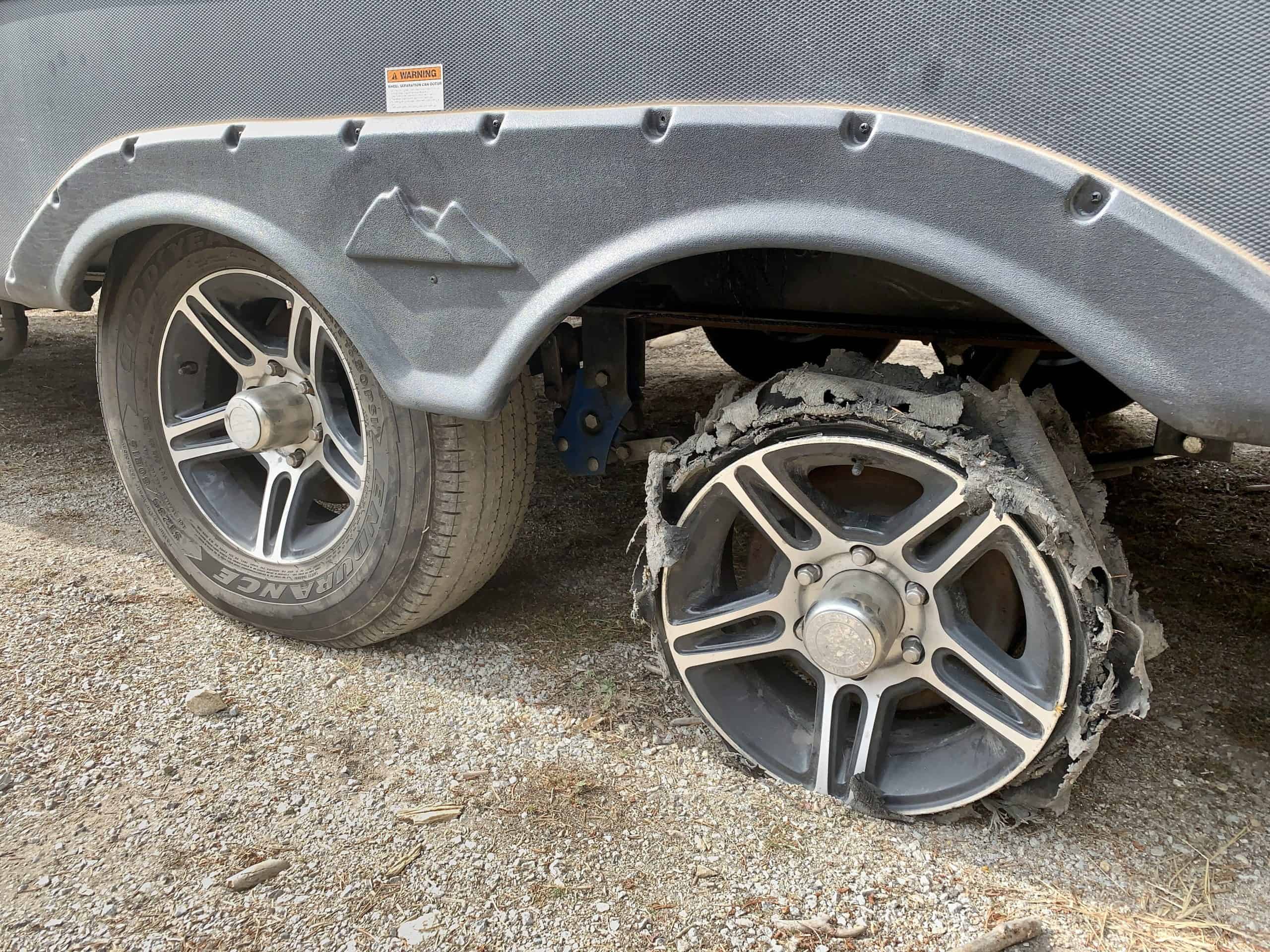
Plus, ensure you have insurance on your RV and vehicle! We have everything bundled with Progressive. (Progressive offers full-timer RV insurance. More on that below.)
However, even with insurance and warranty protection, unexpected expenses may arise, or you may have to pay for things you will later be reimbursed for.
22. What does your miles per gallon situation look like with the truck and RV?
The bottom line: A LOT less than we used to get. Brace yourself because these numbers are not going to be what you’re hoping to hear…
2014 GMC truck towing: 9 MPG / 2014 GMC truck overall: 13 MPG
2020 Ford truck towing: 13 MPG / 2020 Ford truck overall: 20 MPG
23. How much do you spend on diesel fuel?
This will vary depending on how often you move.
For us, we were towing a 35-foot long 12,000-lb fifth wheel. Also, our mileage improved when we switched to the new Ford truck in August 2020.
2019: $5,477.60
2020: $4,861.61
2021 (Jan-May): $974.81.
See a map of everywhere the RV has gone here.
Two things to note: In the second half of 2020, we switched to a 2020 Ford truck with much better mileage on the freeway when we are not towing. We also have not traveled as many miles so far this year.
24. What kind of RV insurance do full-time RVers have?
While full-time RVing, we had a full-time RV insurance policy with Progressive Insurance.
Full-time RV insurance provides coverage specifically for those who live out of their RV six or more months out of the year.
Full-time RV insurance gives you broader liability coverage while you’re parked and living out of it. Whereas a part-time policy often only covers you with vacation liability coverage on your RV trips, full-time insurance covers you against liabilities that occur while the rig is parked, injuries in and around your RV, and losses and repairs that arise around your RV.
It’s most typically used by people in retirement communities who keep their RVs in an RV park spot for over half the year.
I want to note that we had a weld break in the base of our RV, which was holding our axle and wheels in place. We had quite a mess on our hands.
Besides the fact that we were in the middle of nowhere and had a hell of a time finding a tow, Progressive took terrific care of us! I’ve used them for years and have been pleased with the service they’ve provided me throughout those years.
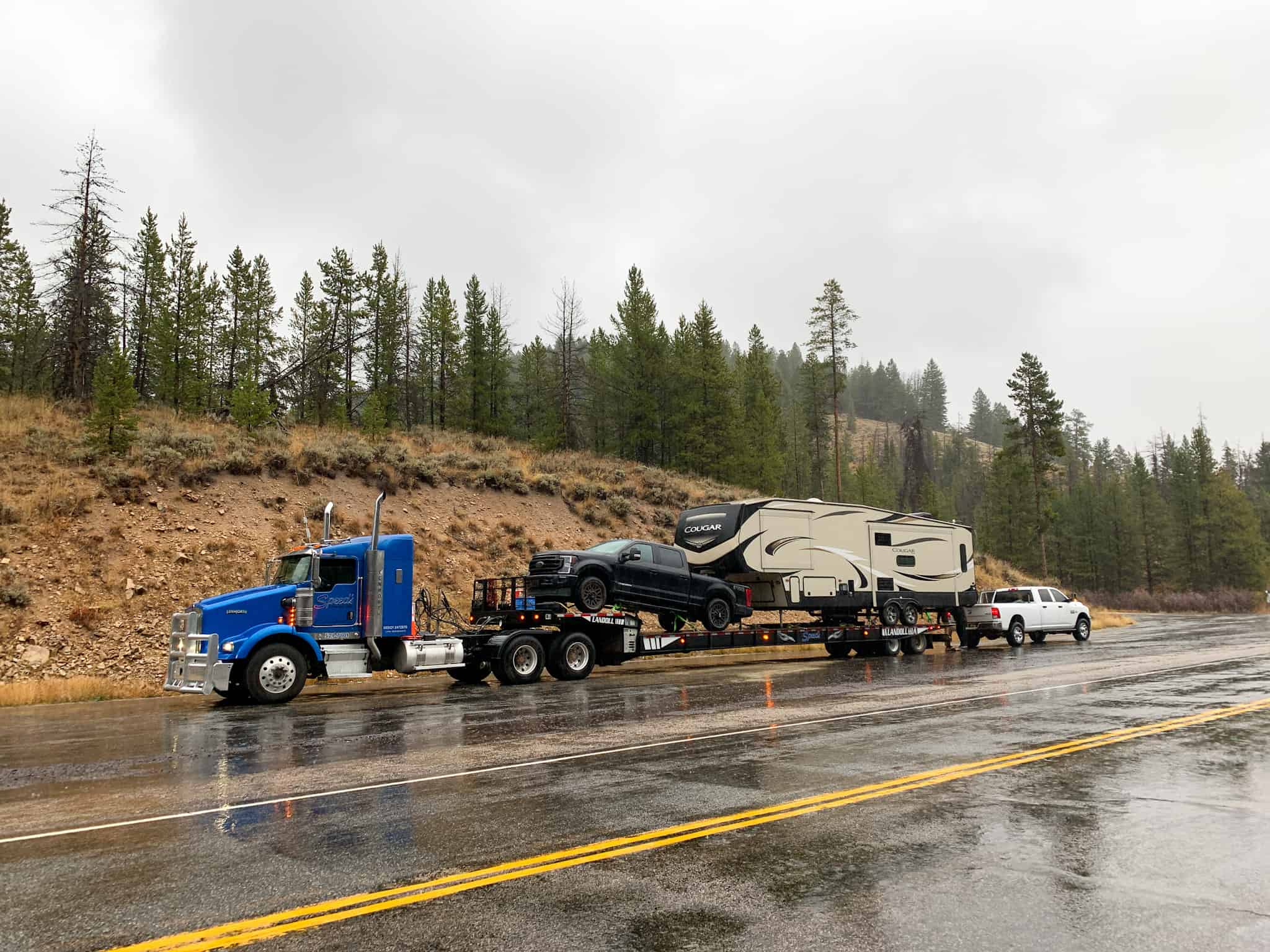
I know Good Sam also has a full-time option. We weighed both options initially, but after bundling our truck and Texas home with the full-timer plan, Progressive ended up being a better choice for us.
25. How do you go about having health insurance?
Ahh, yes, health insurance. We’ve come to one of my least favorite topics to talk about!
To say that the health care system in this nation is a wreck for nationwide travelers is a massive understatement.
That said, don’t get discouraged. Although none of these options are perfect, there are still at least a few.
The most popular ones for full-time RVers are:
- Health Sharing: This is technically not health insurance. These are communities of people who all pay into a pot, which then pays back out to you when you require medical services. After much research, we mainly heard negative reviews of these and have opted to stay away from them. However, RVers do like them because they often give you much more freedom in the choice of hospital and doctor. This brings me to…
- Affordable Care Act / Healthcare.gov: Right now, with the healthcare subsidies, there are tons of affordable options on the healthcare marketplace that make this option super appealing. And it is what we have gone with since the subsidies started. However, state-to-state protection is lacking pretty dramatically, which puts us in a situation where we have very little coverage when we’re outside of Texas. Obviously, this is not optimal for travelers.
For now, with the subsidies, option two works for us.
However, if we were battling big health problems or thinking about having a child, we would need to reassess our options once again.
If that occurs, we will contact a nomad-specific insurance broker. They connect self-employed nomads with plans exclusively available to those working remotely around the world or traveling in the US.
When we started RVing, a broker helped us with a catastrophic self-employed health plan that provided out-of-state coverage similar to what we are currently getting from our Healthcare.gov plan.
They can help with any of the options mentioned above, as well as other options not mentioned, including Fixed Benefit Plans, Tri-Term Health Plans, Short Term Medical Plans, and Global Health Plans.
Working and Staying Connected while Living in an RV Full-Time
26. How do you work while on the road? What is your job?
Working from hotspot internet, from anywhere, was more complicated to explain back when we took off in 2018 than it is now.
These days, many people have adjusted to working from home.
My career path has looked something like this:
I have a 15-year media background working in TV, films, and commercials. That experience included a lifestyle of moving around for jobs with long hours. Eventually, I started building up a personal client base on the side.
Once we took off on the road, I relied on those jobs, which included writing for other publications, social media management, creating graphics, Pinterest management, and editing photo, video, and audio projects for clients.
I also run this website and produce the Locals Know Best podcast from the RV.
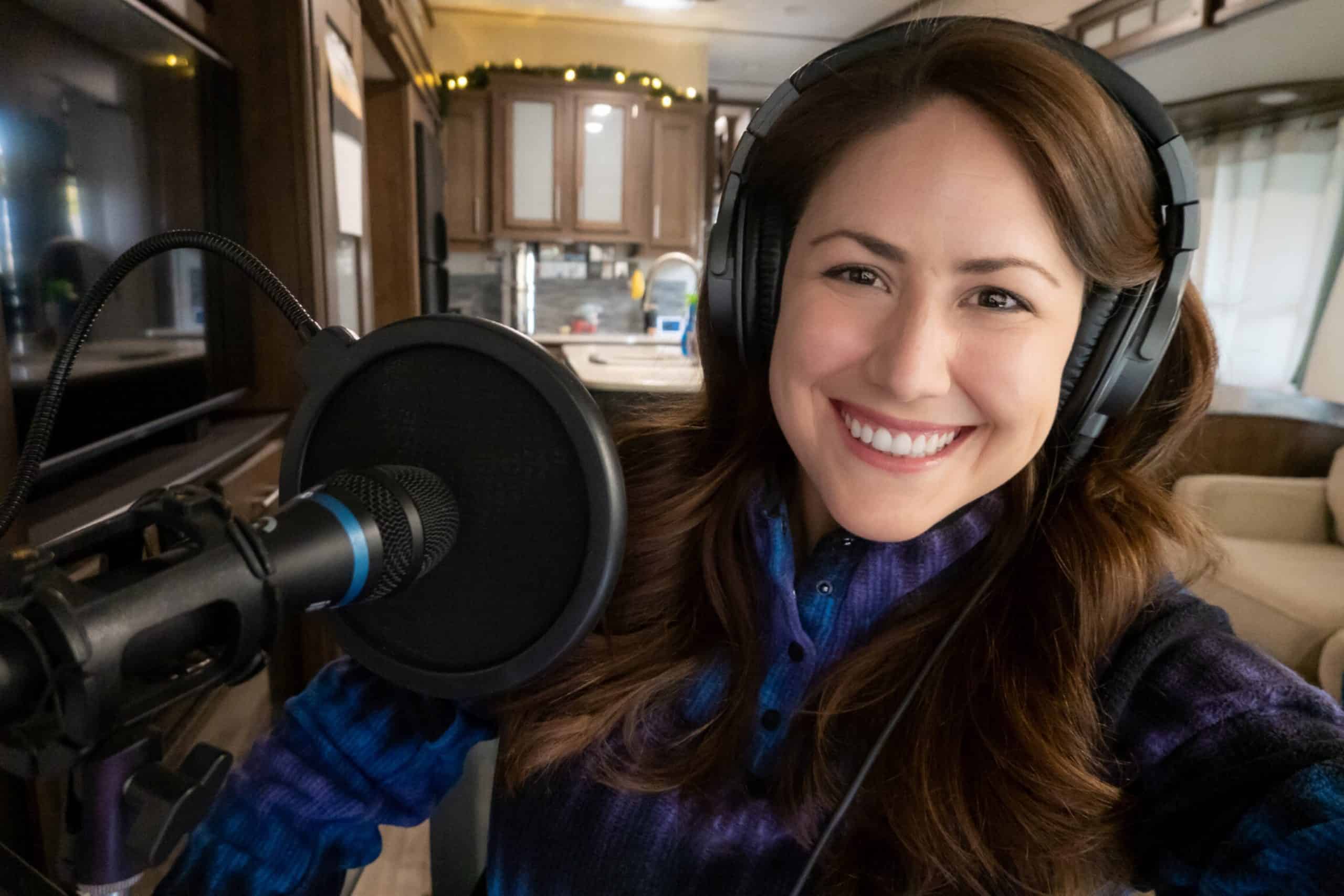
The pros to all of this include:
- Choosing my own work schedule and workdays.
- Not having to endure rush hour.
- Regularly working in different beautiful settings.
- Working with my pets every day!
A minor con I’ve discovered along the way: Being the only person in control of your entire schedule can be tiring.
I’m an avid planner, so this initially didn’t bother me. However, after a while, I noticed that even I can get worn out from constantly arranging work, travel, and adventure day logistics.
My husband drives us everywhere, cooks everything we eat, and has been attending college virtually since we hit the road.
If you are currently looking for a remote job that you can combine with traveling, look for positions on websites such as Jooble.
27. Where do you work?
When the weather allows, I sit in my comfy lounge chair outside at the end of our picnic table!
When it’s cold or rainy, in our much-beloved RV office, which we built ourselves.
Finding an RV with office space back in 2018 was almost entirely impossible. They are often not built with an office space in mind. These days, that’s changing a bit, but still slowly.
So, when we were hunting for our RV, we looked for one with good potential for building an RV desk.
After perusing the internet for RV office ideas, we settled on building a long dual RV desk that would face a big window. Therefore, we chose a rear living RV style with space to easily adjust to a desk. This way, we can visually appreciate each new spot we land, even if we’re stuck inside working.
See the transition below! 👇
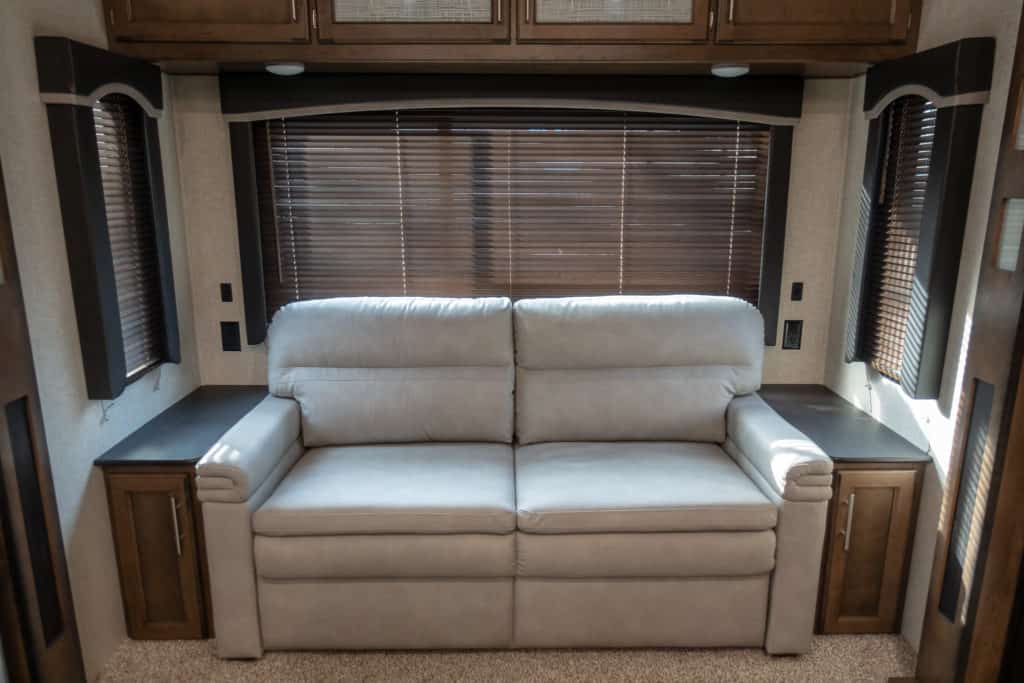
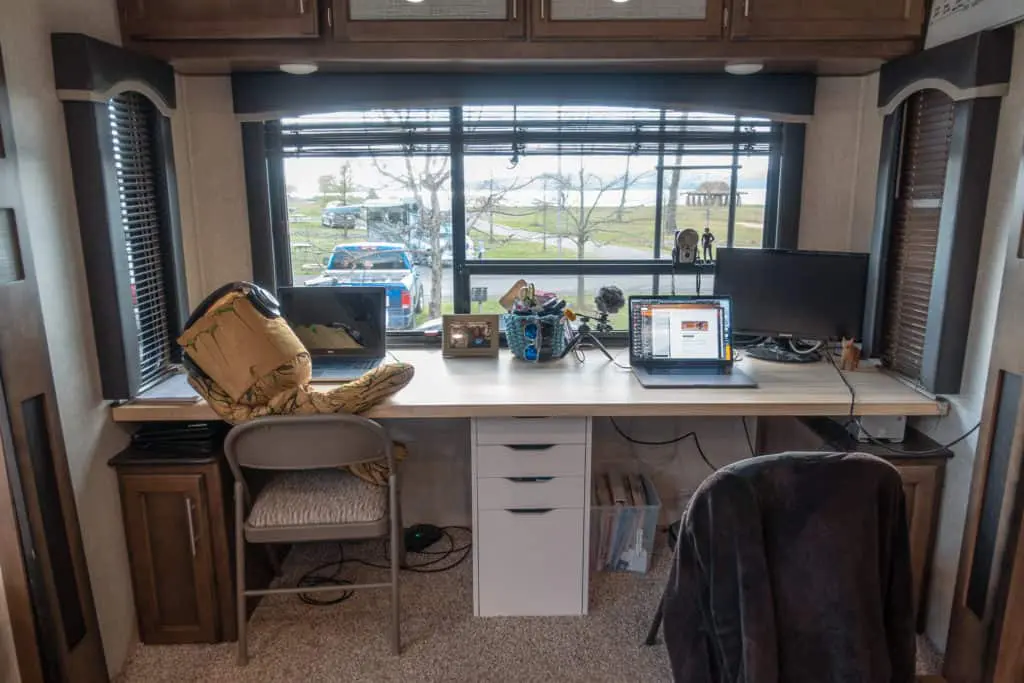
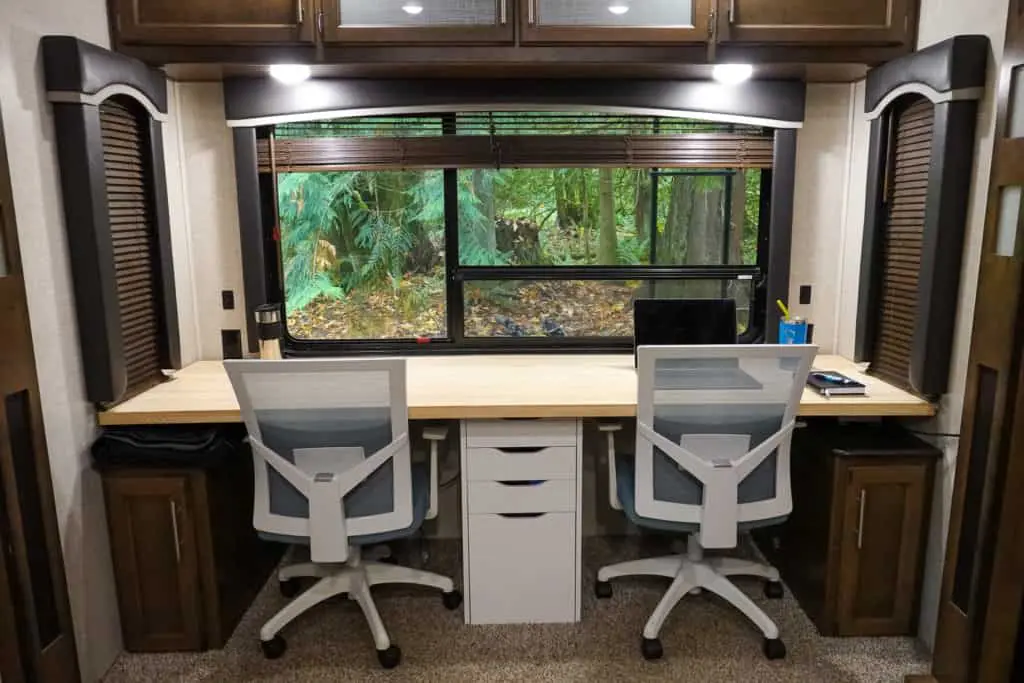
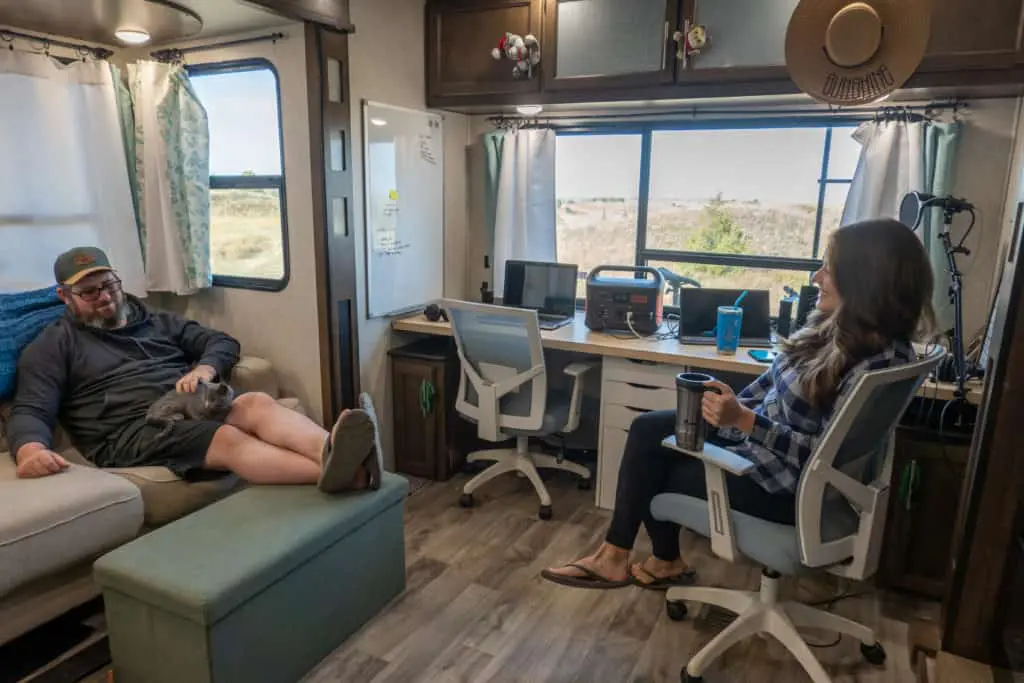
28. How do you get the internet?
These days, a lot of RVers use RoamLink or Starlink.
When we were full-time RVers, satellite internet options were scarce. Even with Starlink, you should know that Wi-Fi will not be as dependable as you’re used to, no matter how much you gear up your rig.
We started off with Sprint phones and hotspots. (I had been with Sprint since the early 2000s…) But honestly, Sprint just couldn’t cut it on the road.
We then purchased a SIM card and hotspot from a sketchy middleman. He was selling plans that someone else had given up, with better data limits than those currently available at the stores. It was costly, and the guy we were working with kept sending us hotspots and SIM cards that only sort of worked.
A few months into our travels, we learned about a truly unlimited Verizon hotspot plan from an article on the Mobile Internet Resource Center website.
We had some problems getting the plan. Two Verizon stores were unaware it existed. But finally, a Best Buy knew of it and set us up.
We made the switch and haven’t turned back since!
Sadly for readers, that plan has since been discontinued. We were grandfathered into it, but I cannot recommend it to new subscribers. That being said, there are still ways to get an unlimited plan! I’m just outdated in my information in this area since we have stuck with that old plan.
I recommend checking out the Mobile Internet Resource Center for the newest information on mobile internet. They live the nomadic life and do a great job of laying out all of the available options on their site.
Once we got the Verizon hotspot, we had Sprint and Verizon hotspot options. We liked having two networks to pick from but quickly realized the other network should be AT&T instead of Sprint, purely due to the better service options across the states.
We finally switched our phones over to AT&T in the summer of 2019 at the Mall of America. And then rode some rides to celebrate! 👇
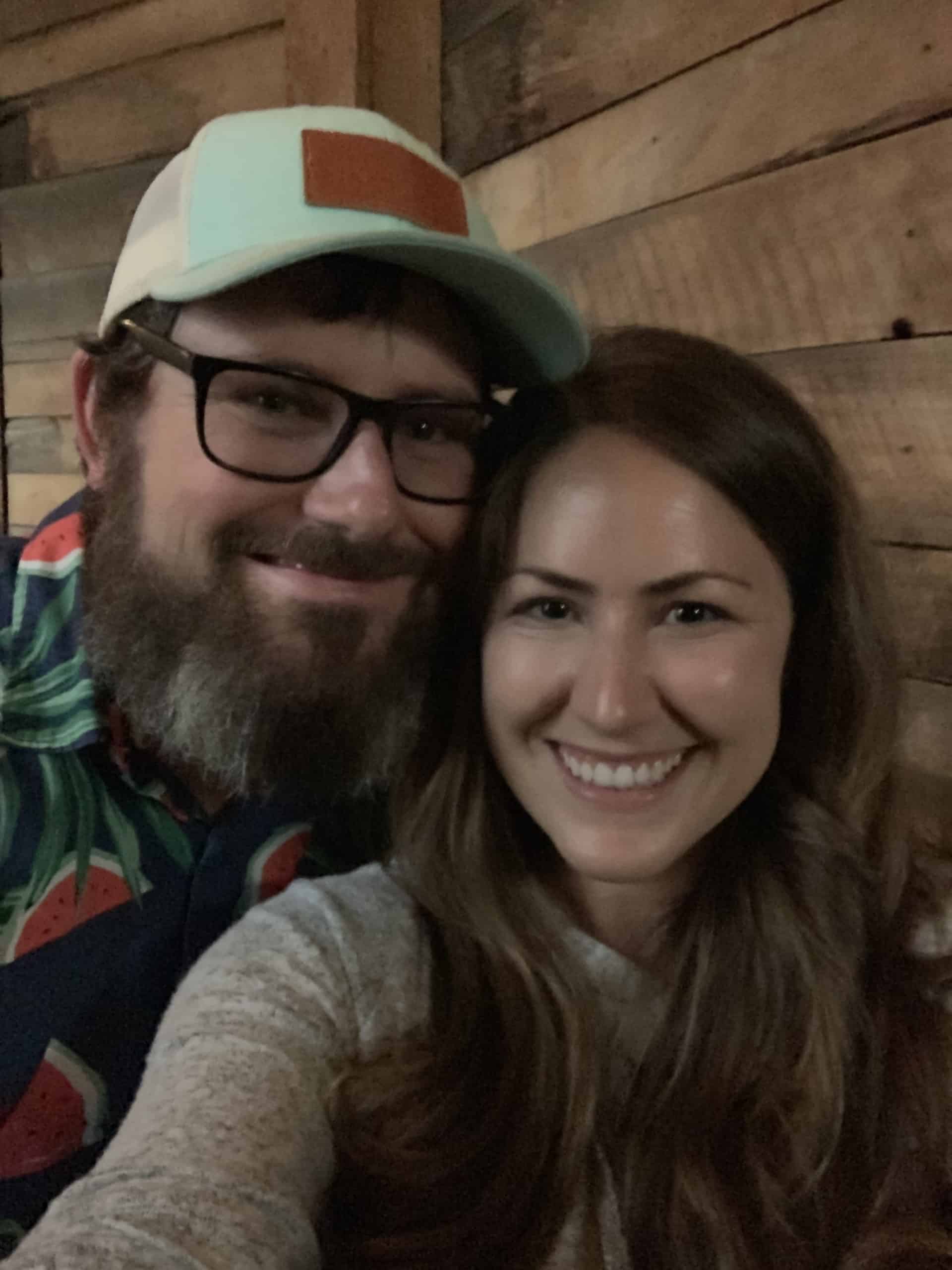
We had minimal problems with this AT&T/Verizon hotspot setup. As stated above, I run multiple businesses out of the RV, produce a podcast, my husband goes to school, and we stream TV in the evenings. Things did run a bit slower, but we adjusted.
Getting Comfortable While Full-Time RVing
29. How do you get and watch TV?
The exact same way we did in our brick-and-mortar home!
We had cut the cord with cable TV long before hitting the road.
In our opinion, with streaming, a digital antenna, and gasp… DVDs, Blu-rays, and cable TV are rarely needed anymore.
Funny story on this topic, actually. Our antenna fell off the roof of our RV about five months into full-timing. It then took us almost 12 months to get a new one. That’s how much of a priority watching the major networks is for us.
The only times not having a digital antenna became a problem was for events like football and the Oscars.
However, part of that year-long wait was due to Keystone dragging their feet and not wanting to admit it was a faulty part (it has been established as a recall now). But part of that was also on us. We didn’t turn it on much, so we didn’t really care when we got it back.
It should be noted that some RV parks come with cable TV hookups! The KOA we’ve been at all spring has cable, so we currently have more television than we had for years before RVing.
30. How do you exist without today’s common creature comforts?
We actually have a lot of creature comforts in the rig. RVs are pretty darn fancy these days! But there are three I miss greatly:
A dishwasher. Dishes pile up because, if I’m going to be honest, neither of us likes to clean. The key to combating bad pile-ups for us is only having 2 of each bowl, plate, cup, and utensil easily accessible and then hiding the rest, only to come out when we have visitors.
Fast Wi-Fi. I have adjusted to working with slow Wi-Fi. However, having no Wi-Fi is a dealbreaker. If we park in a spot where we can’t get anything, we have to move. And faster Wi-Fi, of course, sure would be nice. But it’s a tradeoff I’ve become comfortable with in exchange for waking up in beautiful new locations each day.
A Bathtub. I very much miss this one. Every time we have to stay in a hotel due to family trips or RV repairs, I head straight to the closest Lush and stock up on as many bath bombs as my budget will allow.
31. What are our most used items in the RV? Our “Must-Haves.”
What could we not live without?
If we’re boondocking, we can’t do that in this rig without our:
🔋 Honda 2200-Watt Portable Generator
- This popular model can operate a wide variety of appliances, making it perfect for portable use at home, camping, on the job site, or much more. Reliable Power is now at your fingertips with Honda's Inverted Generators.
- Plug-and-Play Solar Kit: This complete kit includes a 200W solar suitcase, a waterproof 20A Voyager charge controller, and alligator clips. Designed to be compatible with various 12V batteries, it seamlessly integrates into your existing system.
🔋Jackery Explorer 1000 Portable Power Station.
- High-powered Performance: Jackery 1000 Plus Power Station delivers an impressive 2,000W rated output and 4,000W peak power, capable of running your essential devices, including electric grills, coffee makers, and more. Equipped with Dual PD 100W and multiple output ports (2*2000W AC, 2*USB-A, 2*USB-C, and 1*DC car port), this solar generator charges multiple devices (Macbooks, tablets) quickly and also simultaneously.
(An upgraded battery is also on our “someday” list and would help us out a lot!)
When at a campground or RV park, some of our most loved items include:
📱 WeBoost Drive 4G-X RV Cell Phone Signal Booster for RV
- Stronger Cell Signal — Capable Of Reaching Towers At Distances Up To 33% Farther Range Than The Drive Sleek, The Weboost Drive X Rv Signal Booster Offers Fewer Dropped Calls, Better Voice Quality, Faster Mobile Internet, Improved Audio And Video Streaming, And Greater Hotspot Capability — Even In Remote Areas
- POTABLE WATER IN THE GREAT OUTDOORS- Black Berkey Elements remove or dramatically reduce over 200+ typical contaminants that could be present in lakes, rivers, ponds, streams and other freshwater sources—no electricity, tools, or plumbing are required. The Travel Berkey Water Filter System provides clean, refreshing potable water while camping, fishing, RVing, off-grid living and in emergencies, disaster preparedness and recovery scenarios.
⚡️ Progressive Industries Hardwired EMS Surge & Electrical Protection
- ELECTRONIC SAFETY MAINTAINED: Shields RV electronics from voltage fluctuations and power surges; features integrated electrical management system for reliable protection; designed for 50 Amp systems
⛰️ America the Beautiful – The National Parks & Federal Recreational Lands Pass
♨️ Dual Controlled Microplush with Sherpa Electric Heated Blanket
- SOFT FABRIC: Flannel and Sherpa are reversible, making it as a good choice for winter. Can also be used as a normal blanket by simply detaching the controller.
🚨 Proteus AMBIO – WiFi Temperature Humidity Sensor with Buzzer and Email/Text Alerts
- Cloud connected WiFi Temperature Humidity sensor with NO monthly charges
🎧 Plantronics Wireless Noise Canceling Headphones or AirPods Pro
- Rich Immersive Audio: From music to movies - let Backbeat Pro 2 pull you into the richness and definition of quality audio. Enjoy high notes (crisp sound), mid-tones (natural sounds) and deep powerful bass delivers low notes with minimal distortion
- PIONEERING HEARING — AirPods Pro 2 unlock the world’s first all-in-one hearing health experience: a scientifically validated Hearing Test,* clinical-grade and active Hearing Protection.*
- PATENTED SECURITY TECHNOLOGY: As inventors of the rv keyless entry door lock, our handle has been protecting hundreds of thousands of Americans on the road. Our RV door lock is built to protect what matters most and is crafted with high grade metal alloys for durability and safety.
You can read more about why those are our favorite RV life items in these posts:
The Definitive List of RV Must-Haves for 2025 (From a Full-Time RVer)
20+ Holiday Gift Ideas for Full-Time RVers in 2019
15+ Awesome Holiday Gift Ideas for Full-Time RVers in 2020
32. How do you manage your obligations yet also have fun?
It’s hit and miss. Some weeks, we work too much, and some weeks, we have a lot of fun. The goal is to attempt to maintain a healthy balance as much as possible.
When we’ve been in the best flow, we’ve kept track of all our obligations on a master calendar. Then, every Sunday or Monday, we look at the calendar and the upcoming weather and pick a few days we want to be our “off days.” I also like to refer to these as our “adventure days” or our “chill days.”
“Adventure days” are the days we are off exploring the area from when we wake up until we go to bed. We often make these weekdays, so we aren’t competing with locals enjoying their weekends.
“Chill days” are the days we are recovering and watching Netflix. The key is to try to not forget these days. (The enneagram 7 in me often finds myself trying to turn these days into “adventure days,” but recovery time is key to making all the other days function happily.)
Some weeks, we can squeeze in more fun days; some weeks, we can’t even fit one in.
We still get in two daily walks on workdays and sometimes evening adventures during the week. However, for the most part, our fun is happening on our “adventure days.”
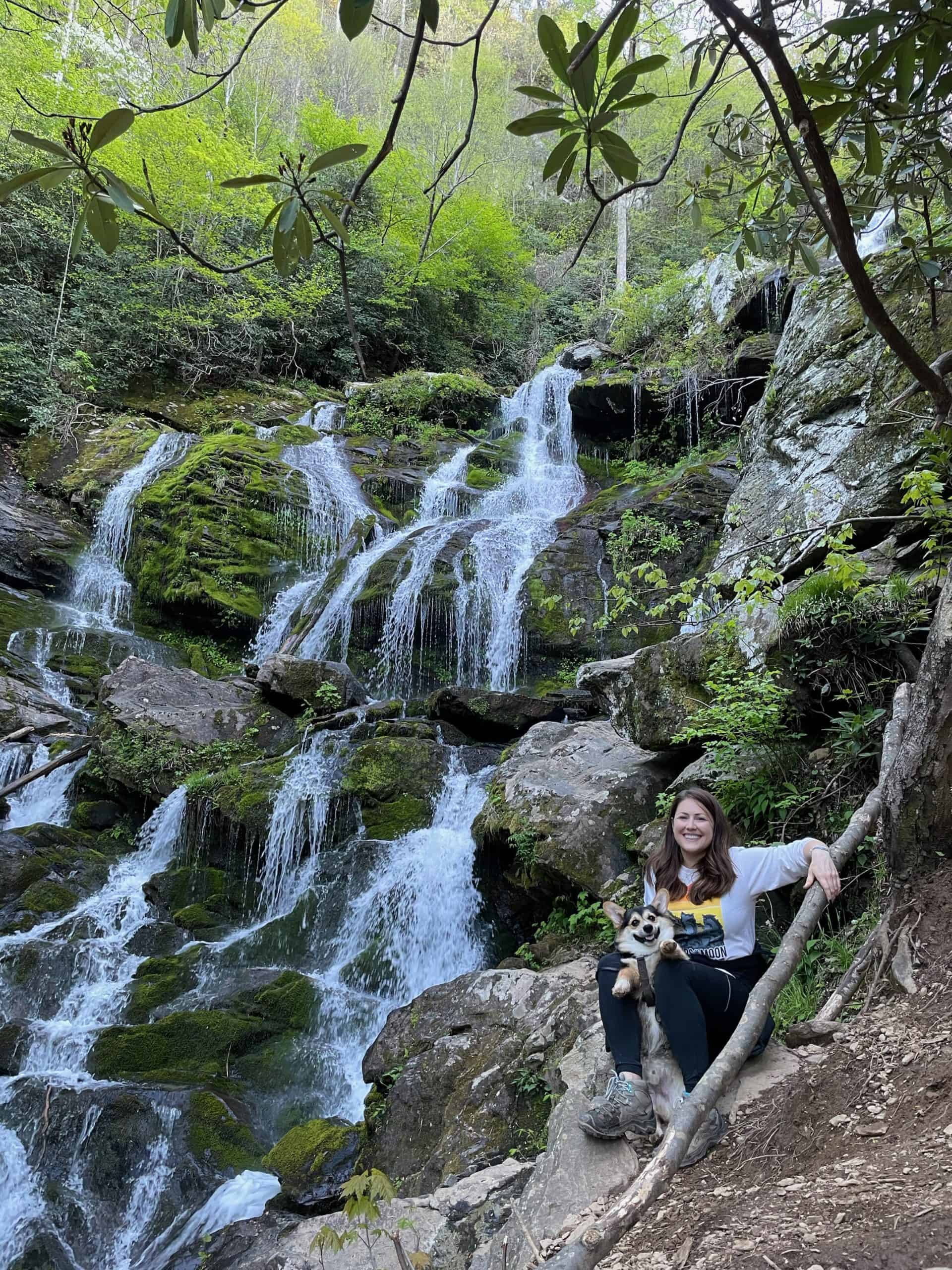
The other two types of days are “work days” and “travel days.”
Every week, we strive for a healthy balance of all four types of days. A bit of structure has always been super helpful in keeping us full of life, purpose, joy, productivity, and, most notably, sanity.
However, what that looks like changes all the time because when you sign up for RV life, you sign up for adventure and spontaneity but also for lug nuts disappearing, fridges breaking, and welds falling off.
At the end of the day, having patience, awareness of what we need, and flexibility have worked for my husband and me.
33. How do you find balance or “flow” on the road?
This one is SO hard.
One of the best perks of full-time RV life is the ability to be spontaneous!
There are lots of times you can just go with the flow! We spent a lot of 2020 going to the US’ lesser visited National Parks (such as Theodore Roosevelt and Voyageurs) and did not have to worry about planning ahead AT ALL!

But there are also other times when you must plan ahead in RV life. Prominent examples include the summer months and any time you want to be somewhere warm during the winter months.
I personally think establishing a rhythm is the HARDEST part of being on the road full-time.
Setting these two tiny bits of order at the core of a very non-routine lifestyle has helped us get a bit closer to that elusive work/life balance:
- What has given us the most rhythm is precisely what I explained above. At the beginning of the week, we look at our calendar and the upcoming weather, make a game plan for the week, and make sure we have a balance of days.
- Beyond that, having a morning routine is super helpful. Ours looks like coffee, working out, and walking Marty. I also try my best to get up an hour before Barrett and knock out some work before he gets up, so I’m already feeling a bit accomplished on our morning walk.
34. How do you stay connected with family and friends?
I was born and raised in Michigan, and my husband was raised in West Virginia. I have worked in Michigan, Ohio, New York, California, Texas, and Pennsylvania. My husband and I met in Texas and own a house there. These days, we base ourselves in North Carolina.
Our community of family and friends before RVing was spread throughout the United States and beyond, and it continues growing.
However, since hitting the road, we’ve seen more of the people who matter most than we ever used to when living in one place!
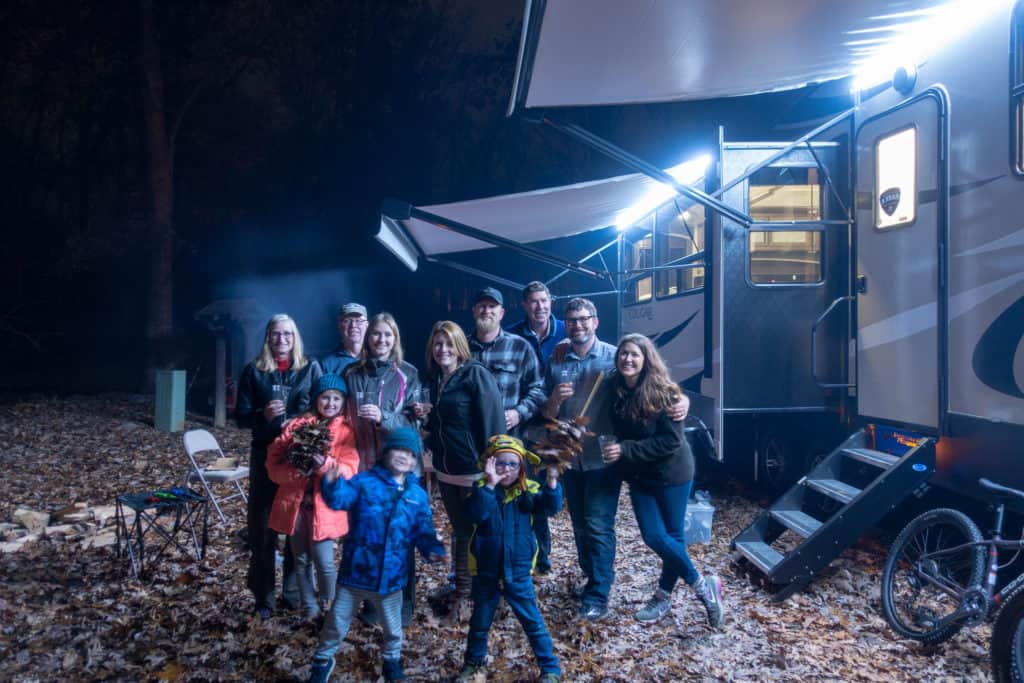
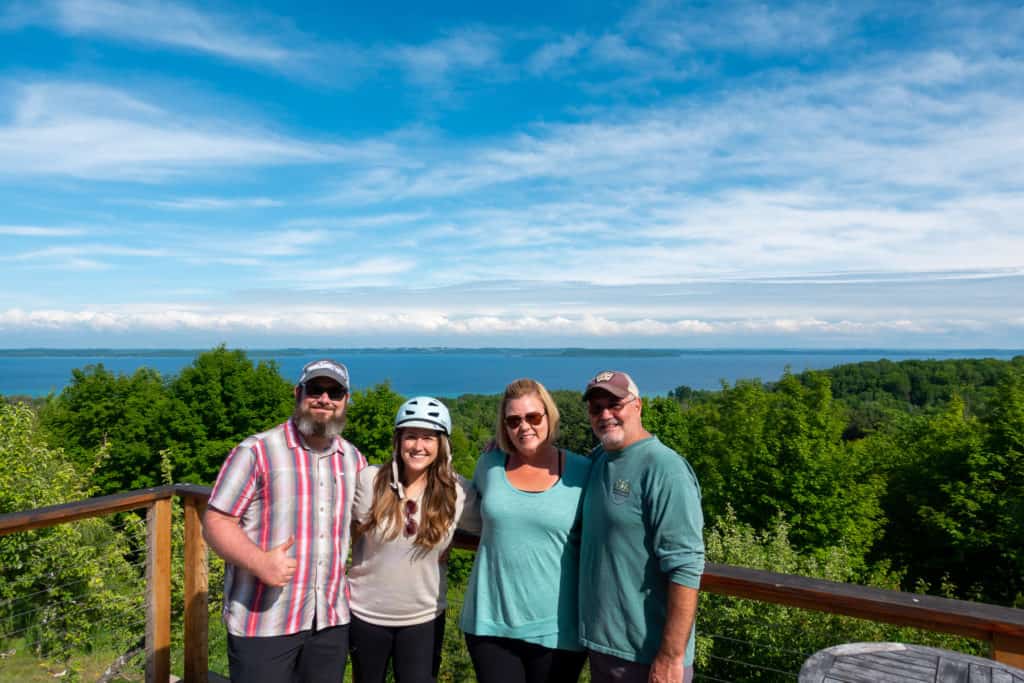
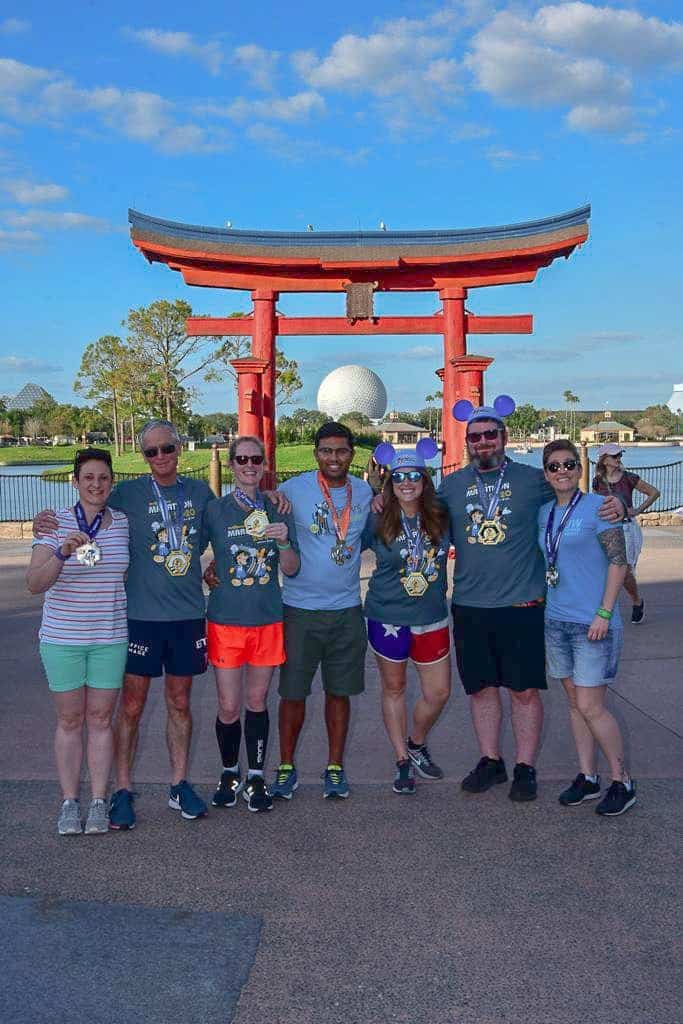
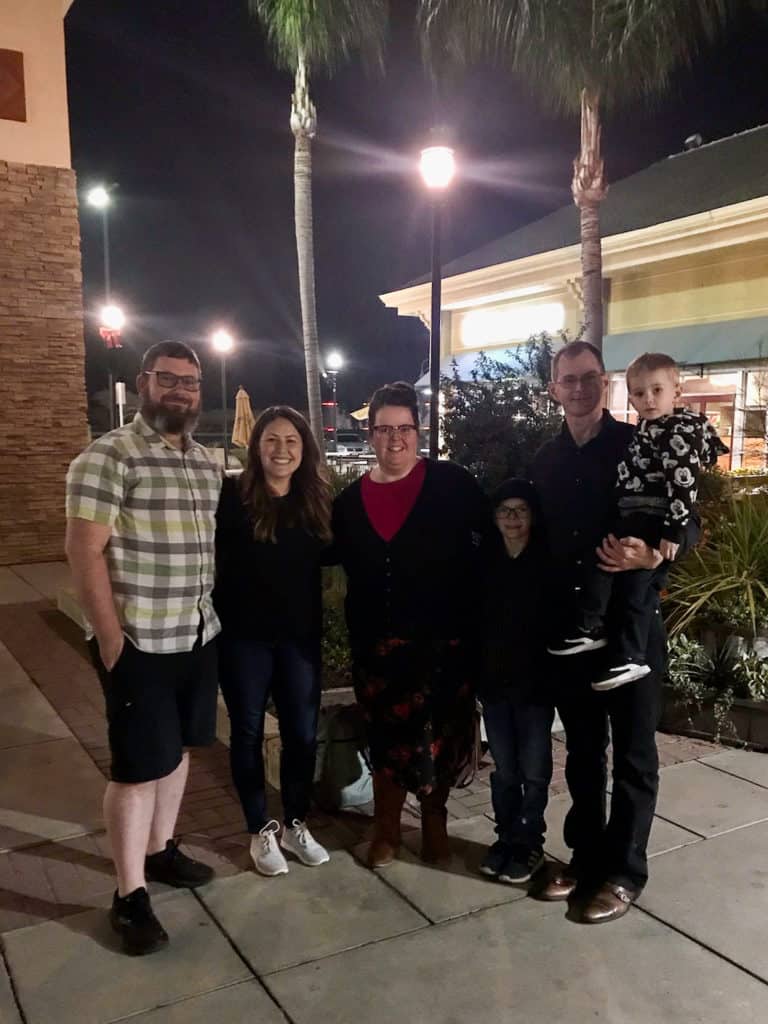
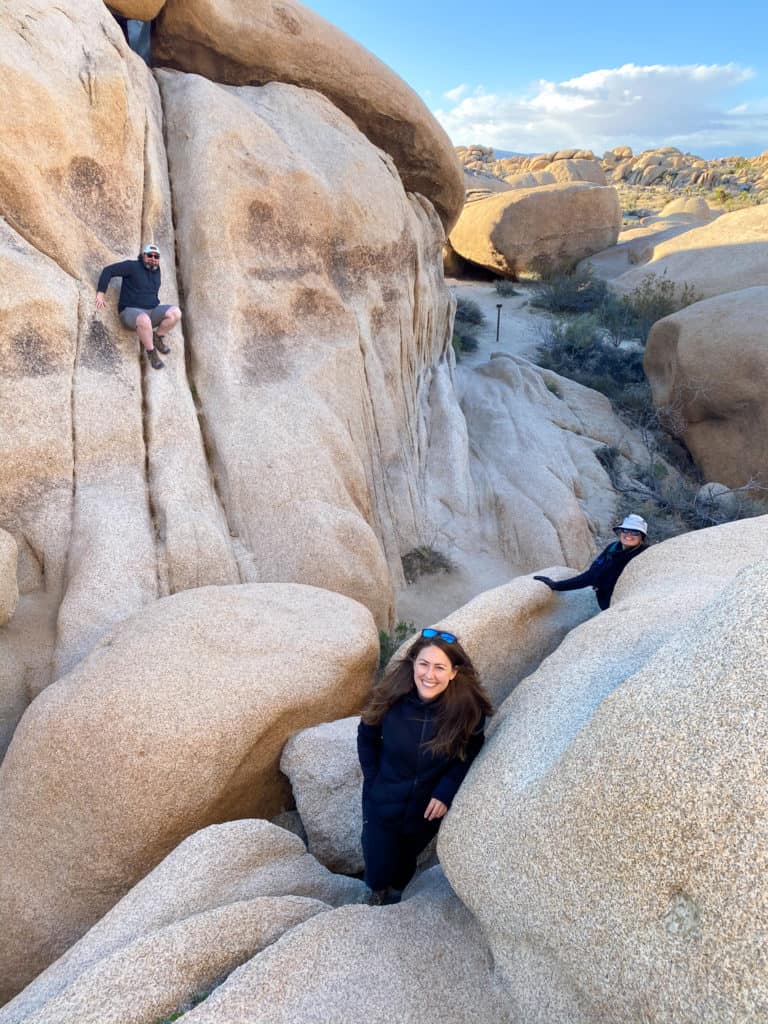
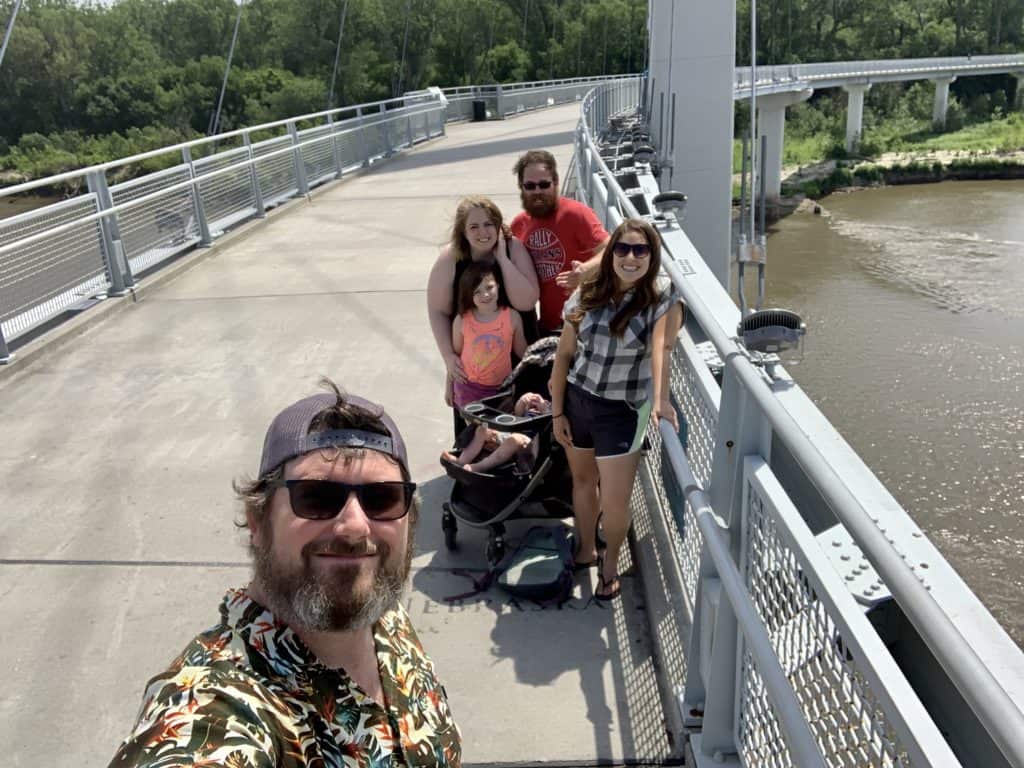
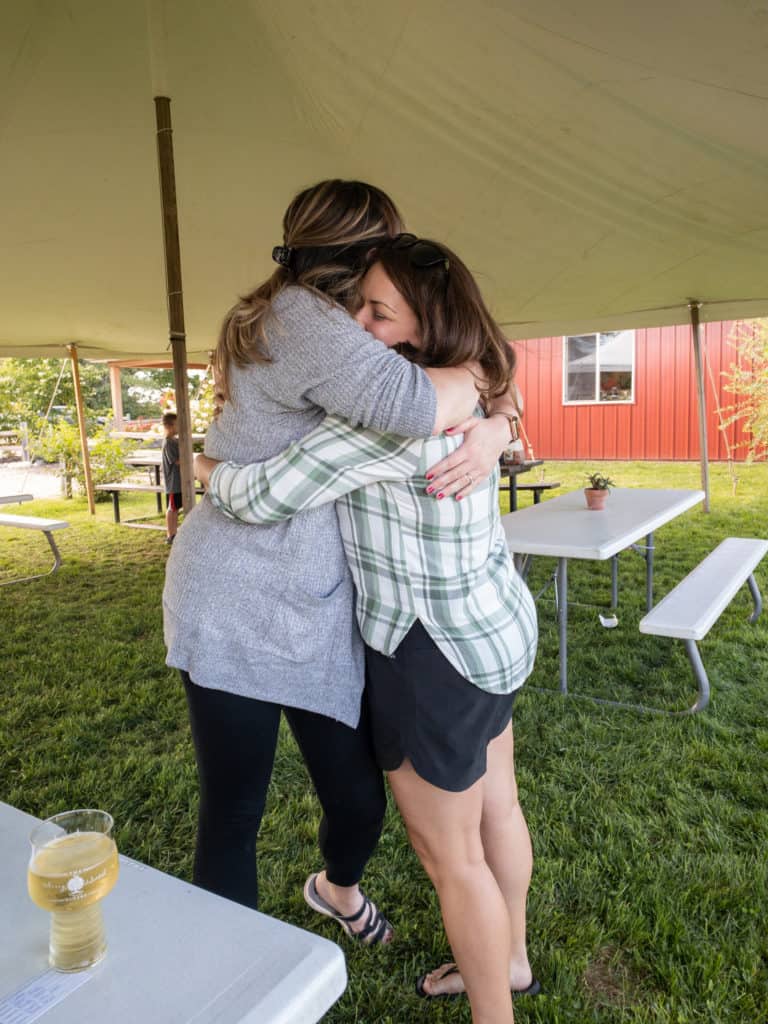
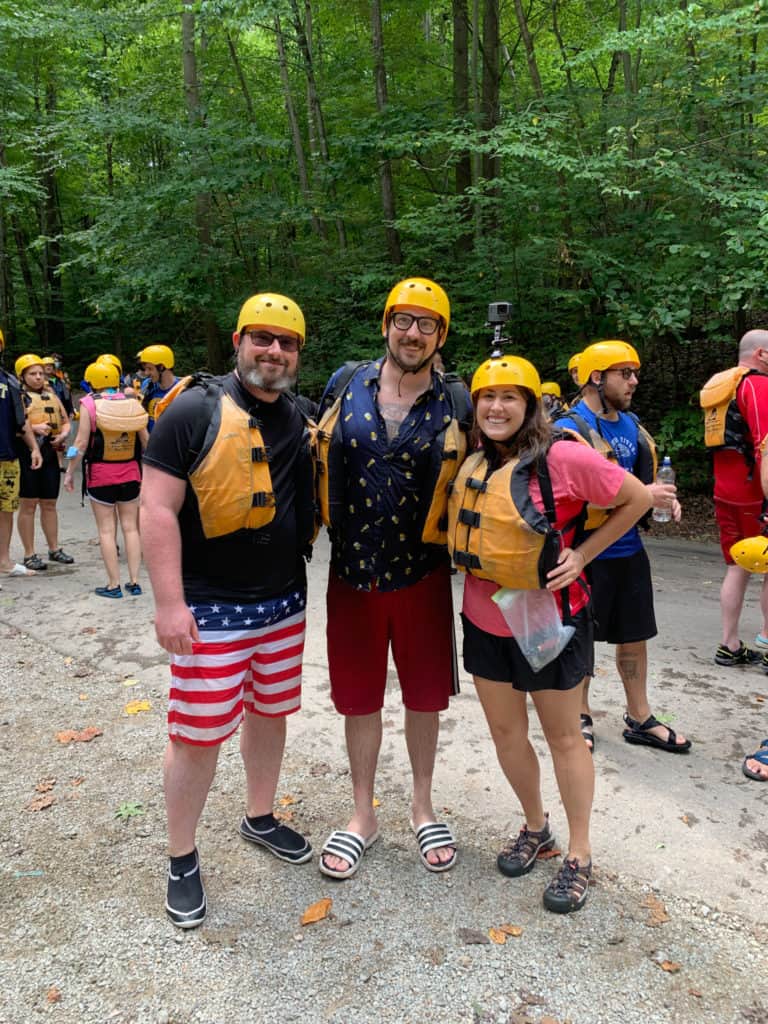
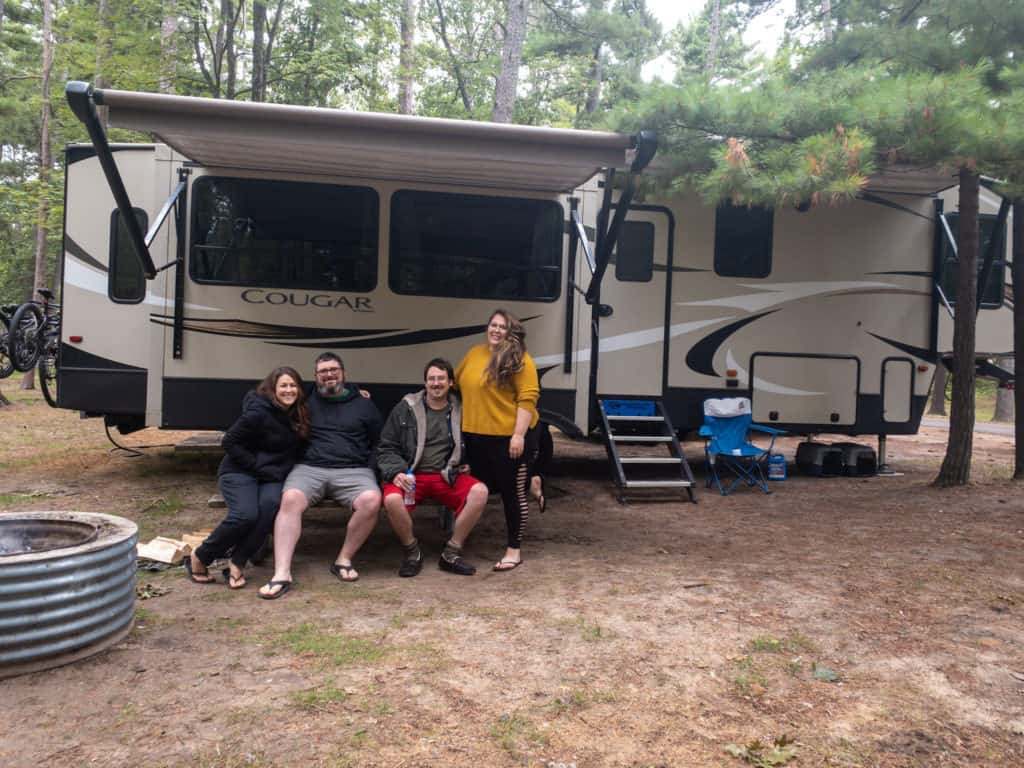
35. How do you find community on the road?
Online and in person!
The RVer community is exceptionally kind and welcoming. We find it really easy to meet new people in the RV parks we go to. And now, with Marty, even more so!
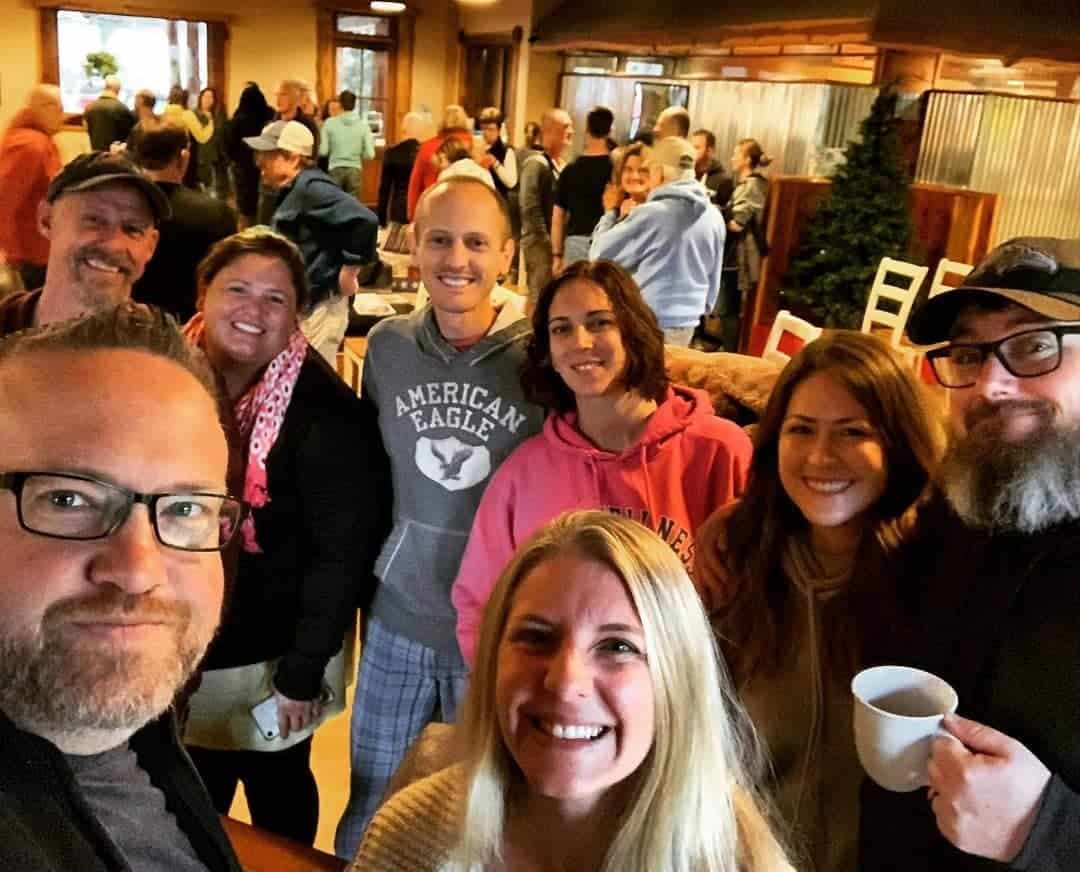
However, there are great groups online! My favorites for RVers our age who work on the road are Xscapers and The RV Entrepreneur group on Facebook. Both of these groups also have in-person meetups, which are great for meeting new fellow RVers!
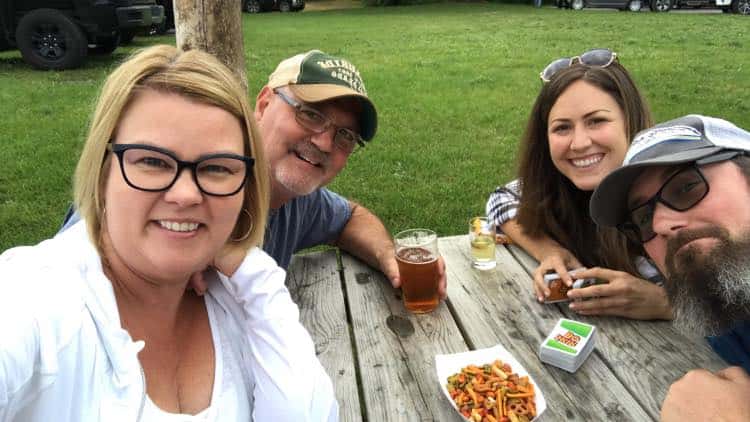
You can also find groups with particular interests online. Then, as you travel, you can find the locals in those groups. I have two cousins who are each a beer enthusiast and a historian, and both meet up with their digital friends as they travel.
36. How have you and your husband handled living in that small of a space?
You might think living in such a small space with a significant other would be tough, but I actually think we’ve handled it quite well.
Don’t get me wrong, many situations can sour a pleasant day in RV life.
If you think life on the road is all about relaxing in a deck chair and enjoying your surroundings, then I have news for you. You will inevitably encounter situations where things go from good to bad quickly.
Converters fail, welds holding axles break, and trucks break down. Many mechanical disruptions come with living full-time in an RV. Still, we’ve found it’s a fair tradeoff when you also think about all the good things associated with this lifestyle, such as seeing so many new places and meeting people from different walks of life than we’re used to in our day-to-day lives.
That being said, we’ve always genuinely enjoyed being together and spending our days together. I truly think we’re two of the lucky ones.
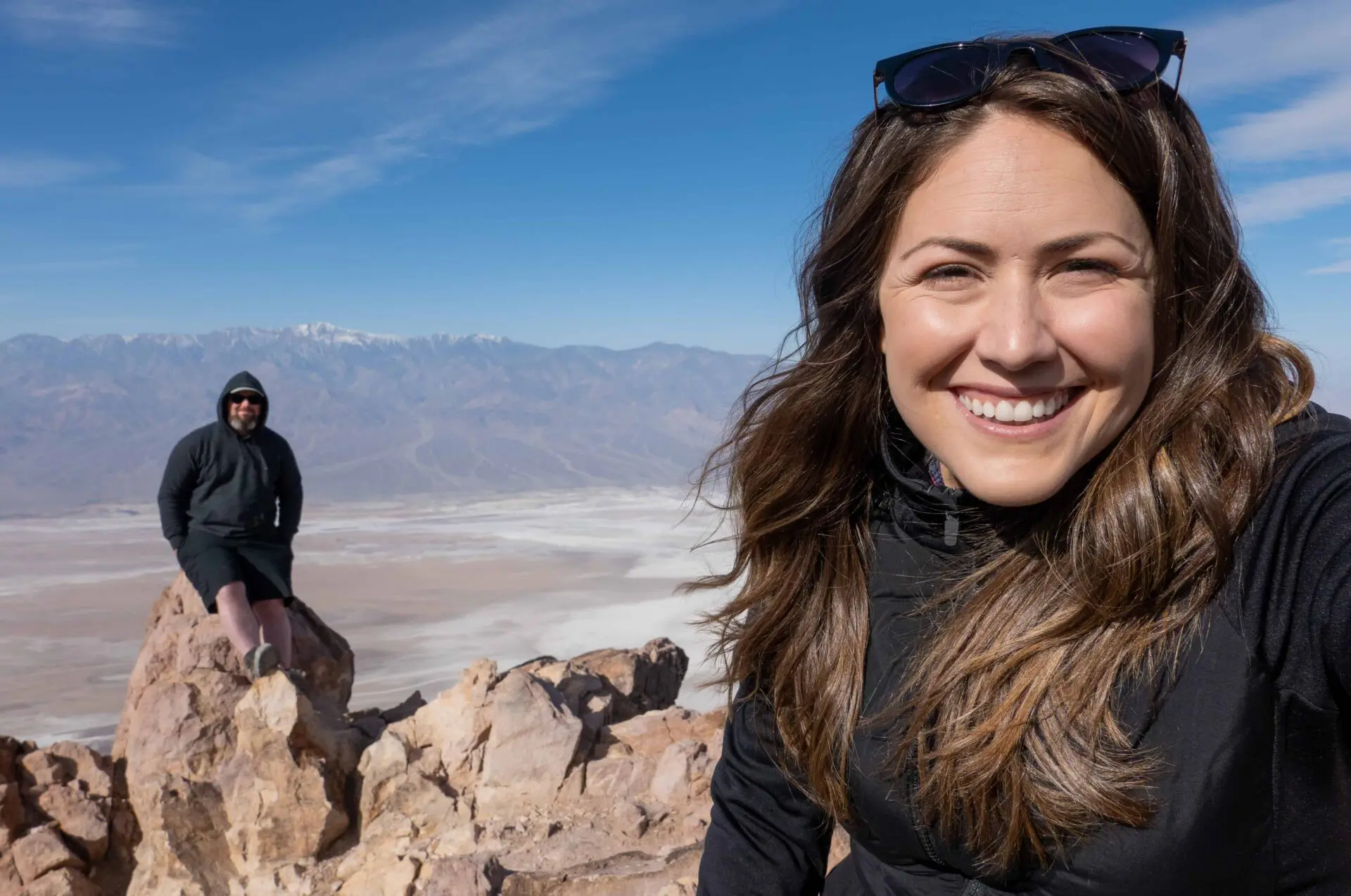
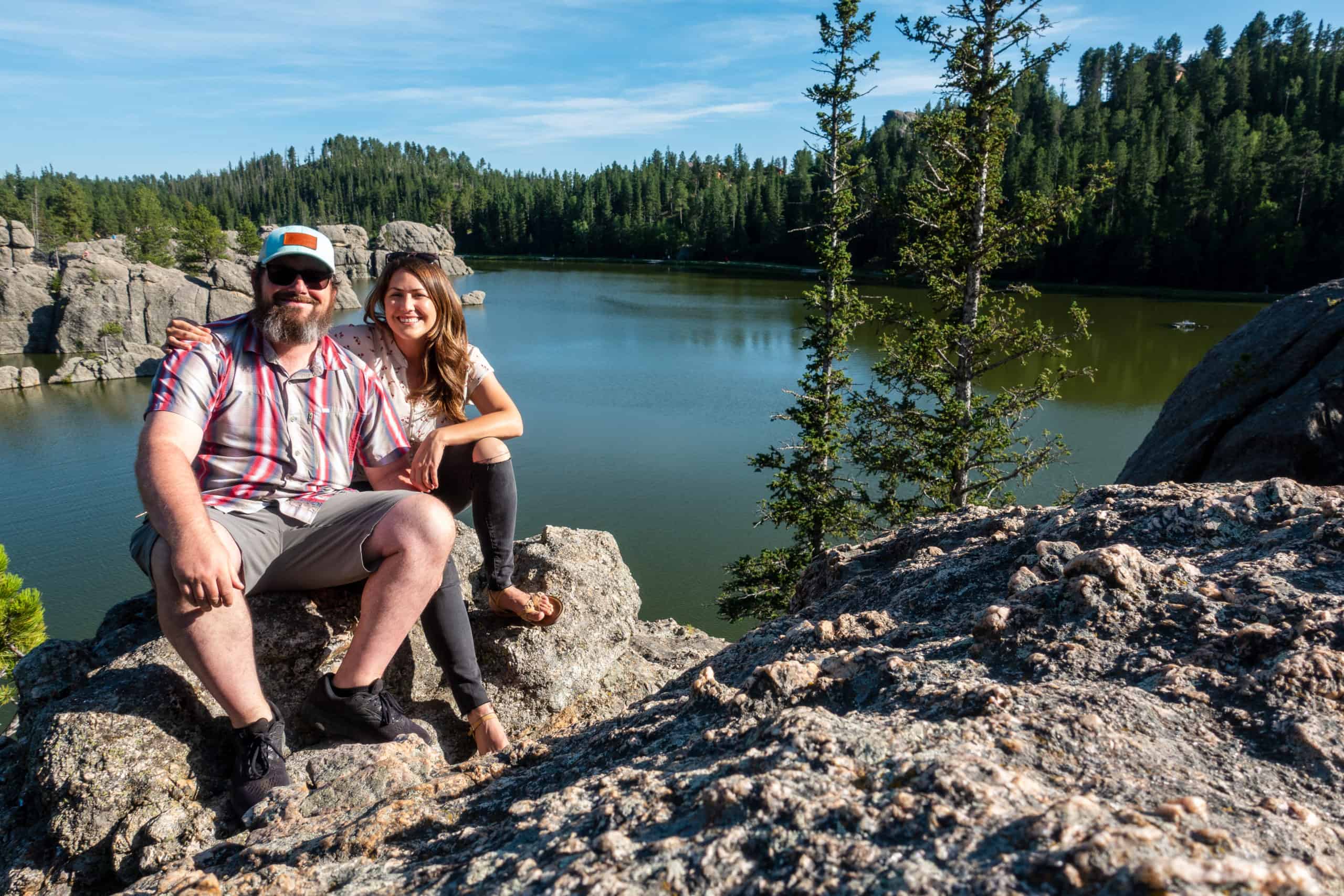
Do we get into arguments? Of course!
But the small space means we also work through them and get out of them quickly. There’s just not a lot of room to ignore each other or let anything brew.
I believe we are now much closer than we ever would have been before, being separated five days a week. And that has honestly just expedited our getting to understand each other and helped us function as a duo.
Real talk, though. My friend Tina wrote a really great (and funny) article about how to cope, from a full-time RVer’s perspective, for anyone currently trying to live and work in a small space with their significant other. (She even included some quotes from my husband, Barrett!)
Just know that this lifestyle comes with many ups and downs, straight-up unknowns, and a lack of routine. You can frequently stretch your boundaries of what’s comfortable, and it can be tiring to constantly push the edge of what is comfortable.
In RV life, you may feel you need to check your emotions more often than in brick-and-mortar life. Self-care and patience are crucial.
This lifestyle has also made us find creative ways to tackle the tough things. Look here for a classic example of what any couple who has ever worked together on parking their rig has experienced.
37. Do you live with pets on the road?
Yes! We started our RV life journey with my two older cats, Squirt and Vodka.
The same year we had started full-time RVing, Vodka was diagnosed with Lymphoma. She was given a two to four-year diagnosis and lived happily on a very low dose of chemo for a little over two years. She was great on the road and loved watching everything out of the RV.
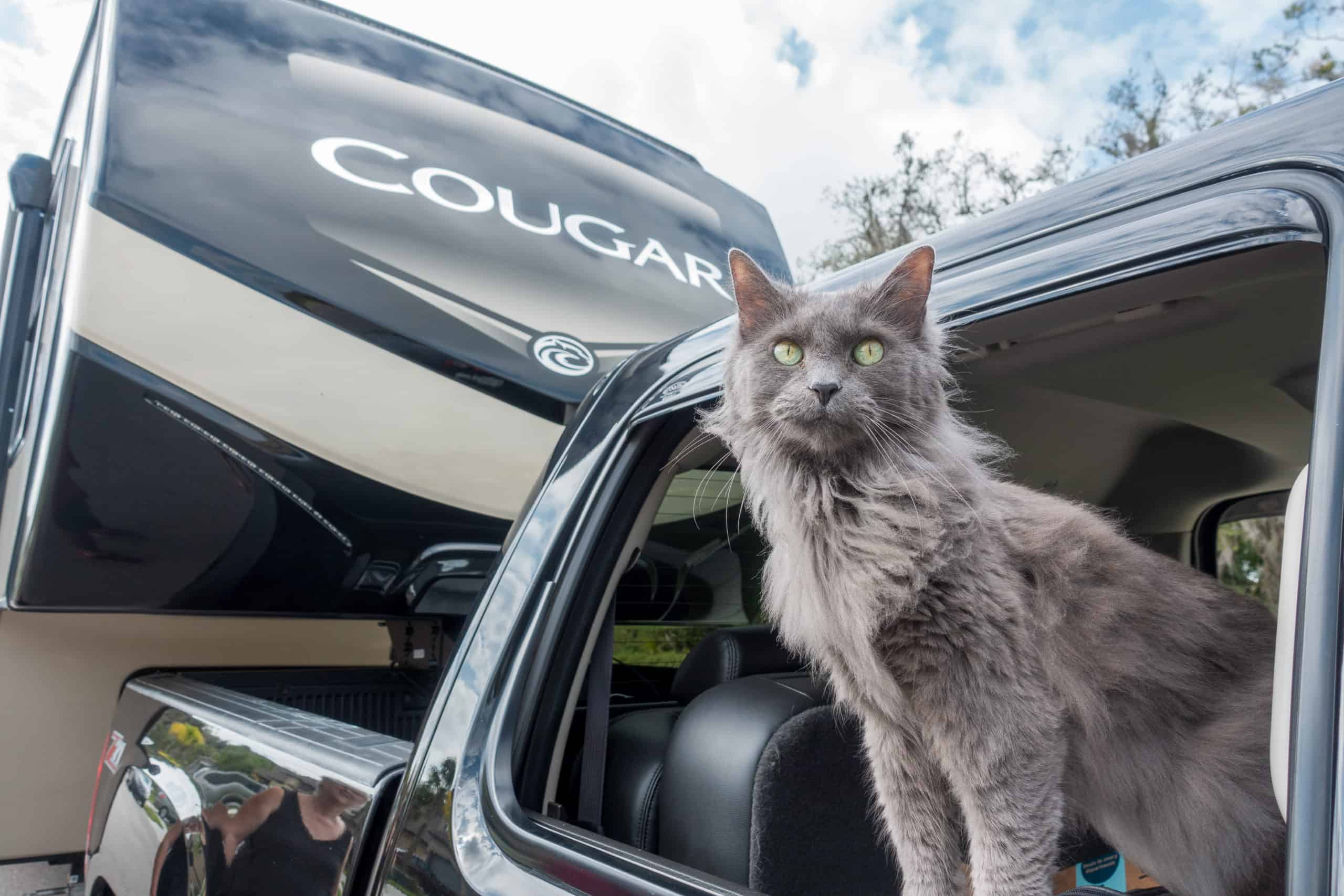
Squirt was not a big fan of travel days but otherwise loved everything involved with RV life. Three years into full-time RVing, she passed away from a mix of old age and health complications.

When Vodka passed, the clinic where we had to put her down had adoptable kittens. We had friends in big cities who were trying to adopt pets and having the most challenging time. We took it as a sign and adopted our dear Dakota!
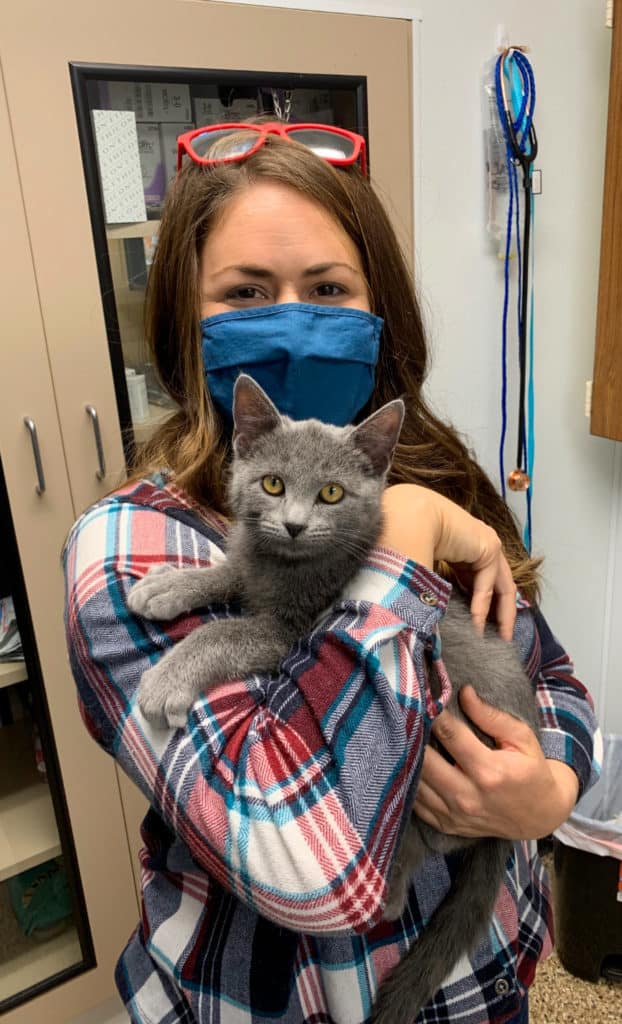
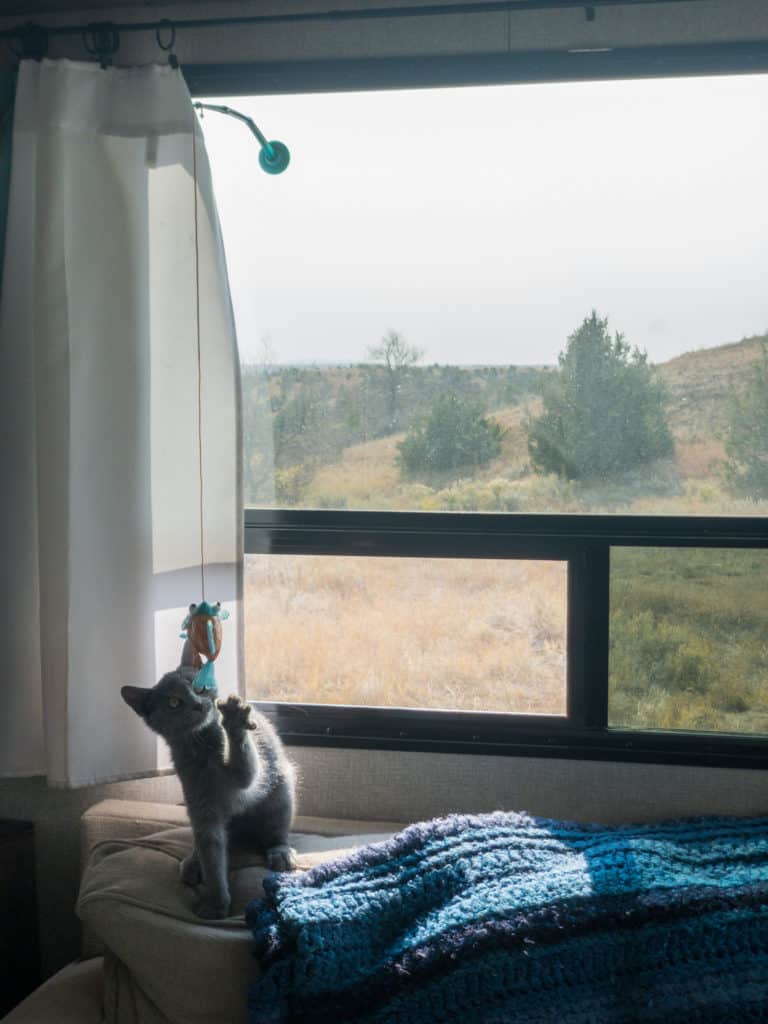
Then, that same week, we got a call that our names finally came upon a Corgi list. (We were on several nationwide and had been waiting for quite a while.)
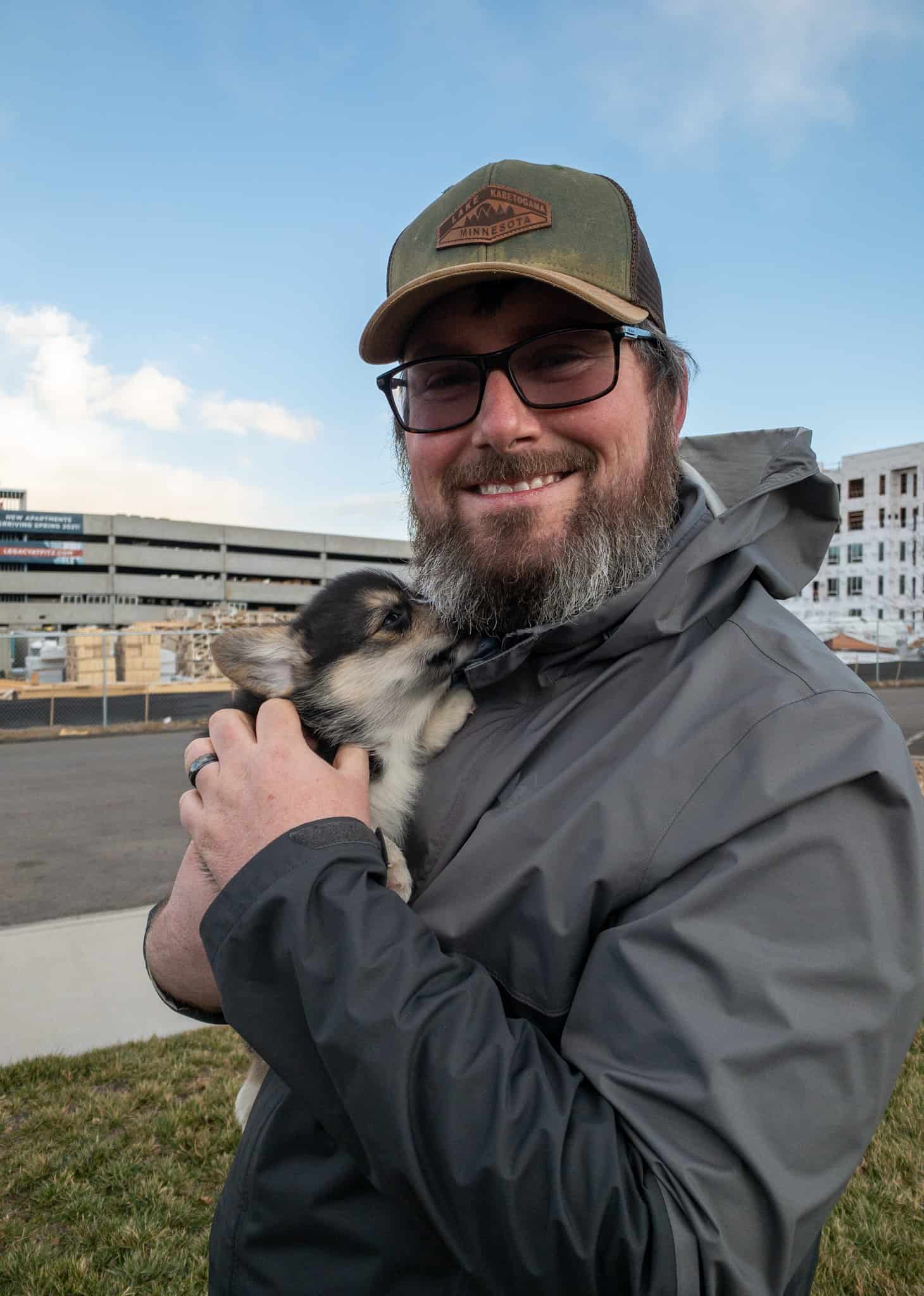
So, later that year, we added Marty to the family!
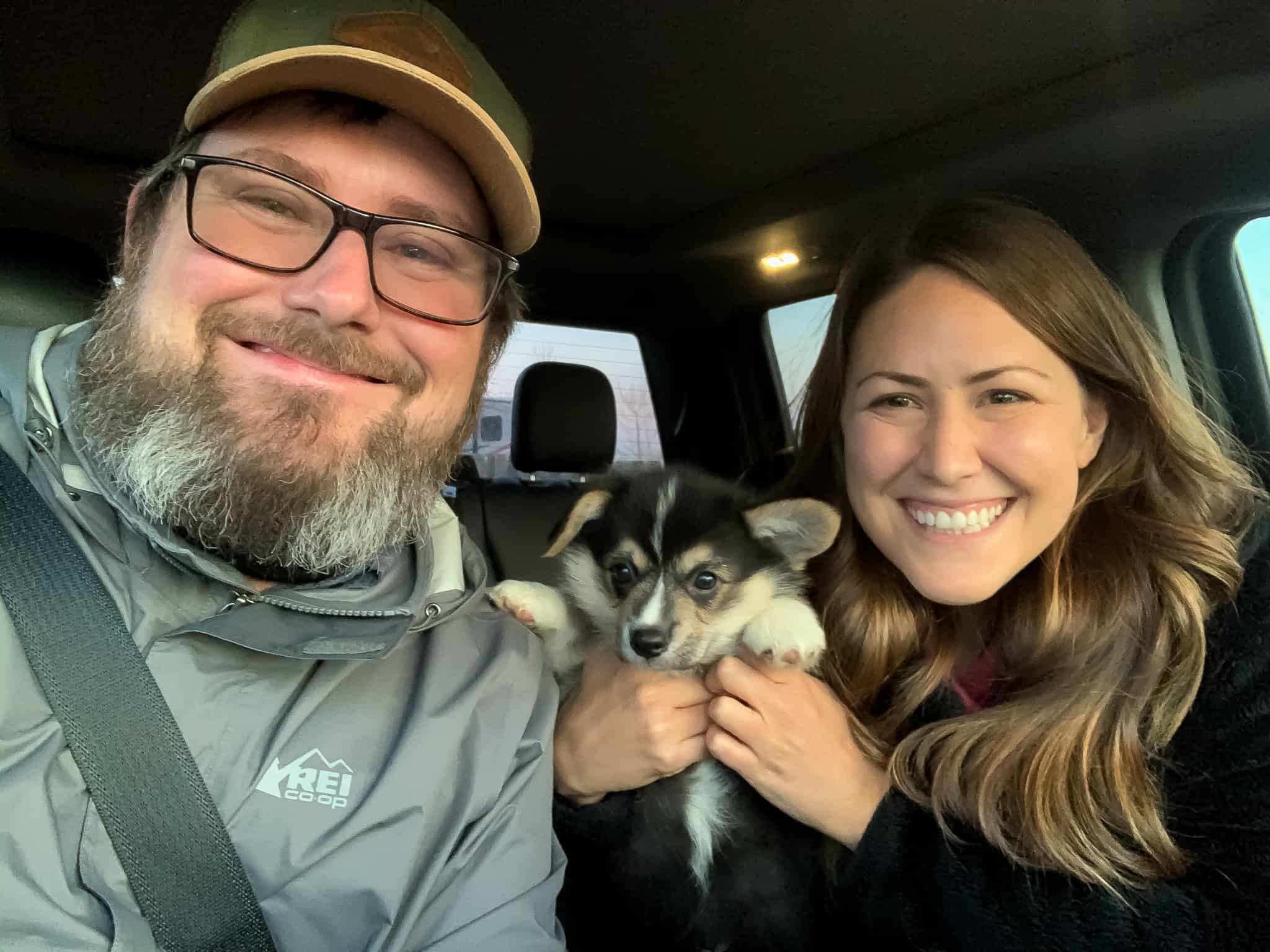
I’m happy to report Dakota and Marty love each other very much. They play constantly, and the RV’s energy has changed dramatically since adding them in the most wonderful way!
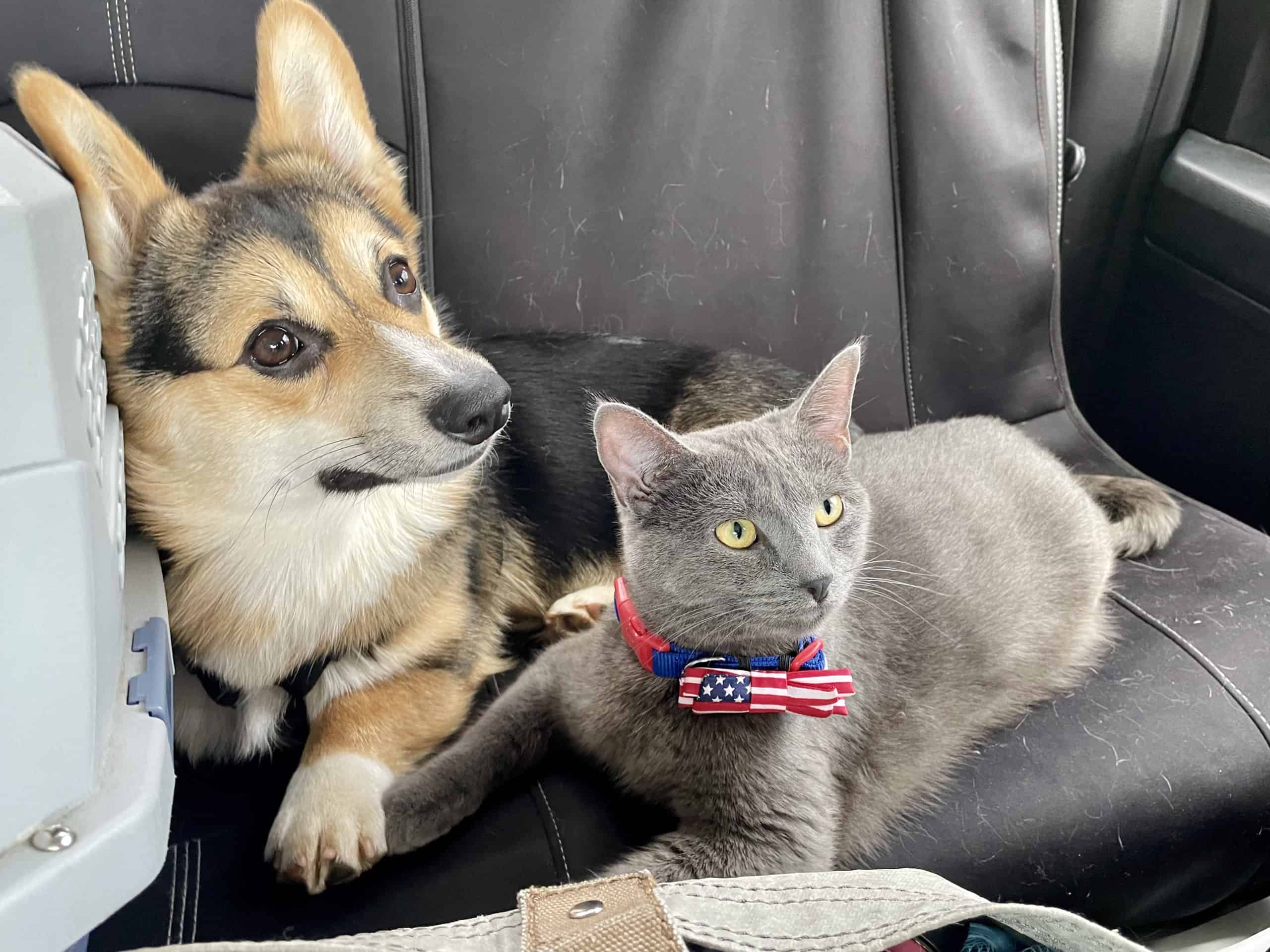
I keep a lot of paperwork for all of the pets, just as you would for yourself. This makes getting new vets up to speed on the animals’ health issues easy.
I used the Veterinary Cancer Society to find oncologists for Vodka and the AAHA-Accredited Hospital Locator to find vets for all of the pets in each new location, as needed.
If we ever left the camper for more than a day, we would use Rover to find pet sitters. Over the past ten years, we have been Rover sitters, and we respect that company.
We also have had a Ring camera installed for added pet monitoring and security in the rig while we’re away, as well as a temperature sensor (mentioned above in our must-haves) that alerts us if anything goes wrong with the internal rig temperature.
- See, hear and speak to people from your phone, tablet or select Echo device with Outdoor Cam (Stick Up Cam) Battery, a battery-powered camera that’s built for outside, but ready for anywhere.
- Cloud connected WiFi Temperature Humidity sensor with NO monthly charges
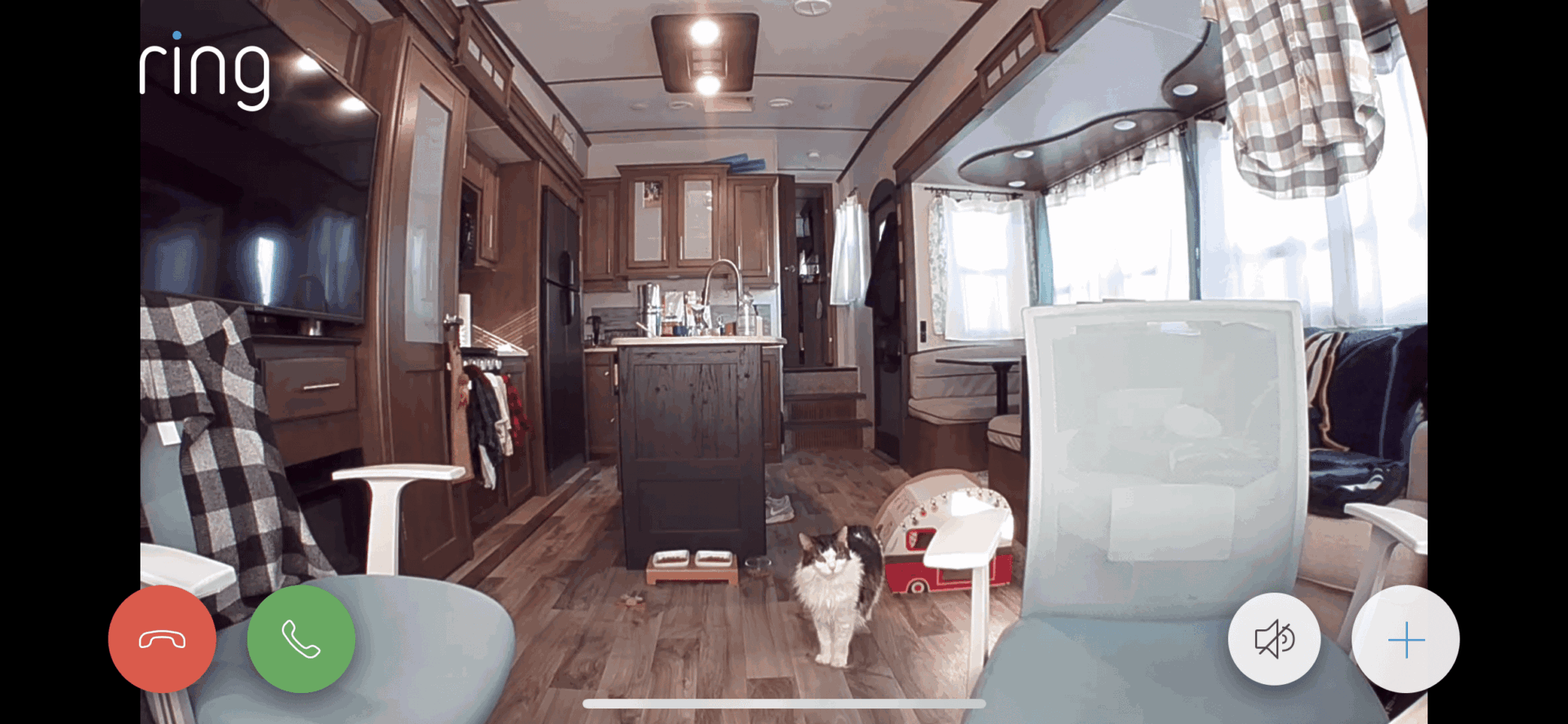
38. How do you guys get in your exercise?
While on the road, we learned that it is possible to be adventurous and outdoorsy and still not feel fit. We’ve had phases of missing a gym very much. Barrett and I both put on our “freshman 15” while in the RV.
I always tried my best to do YouTube workouts, but at the end of the day, it is a tight, shaky space.
We briefly signed up for Anytime Fitness at the beginning of March 2020 because we see them all over the United States. We worked out 2-3 times before the world shut down. We even decided to equip our RV with a stationary bike for a bit!
Adding Marty to the mix means we now go on two long daily walks, which is one addition that has become really helpful.
Also, picking an RV park, campground, or boondocking spot that feels walkable has become increasingly vital to us on the road. These days, we always make sure there are at least a couple of miles of paths or walkways around the park before booking.
The most significant challenge for us has been eating healthy because there are tons of delicious food and beverage temptations in every new town we visit!
Ultimately, when it comes to staying in shape, it’s all about making the time for a balance of strength training and cardio, no matter where we are or what lifestyle we’re living. Plus lots of water and vegetables!
39. Where does your bathroom waste go?
We have a toilet with a foot pedal, like on an airplane. You hit the lever, and everything disappears into our black tank, which we empty ourselves. We monitor the tank with a digital gauge and dump it either at a sewer spot provided at our site or at a dump station, as needed.
Our Full-Time RVing Experience
40. Where’s the best place you’ve been?
If we’re ranking these questions in order of how often they are asked, then this should actually be question #1, and it’s SOOO hard to answer.
Barrett: Glacier National Park and Montana in general. Also, Voyageurs National Park. He loves all of the quiet and open space in those locations.


Cindy: I have been a massive fan of Leavenworth, WA, Fort Collins, CO, and Grand Lake, CO. I also really loved showing my husband all of the fantastic places I grew up camping in Michigan. Finally, I found Fall in Voyageurs National Park in Minnesota amazing! We had the place to ourselves, and it felt unreal.


41. Who drives the RV more often?
Barrett did. But I offer! It became a point of pride for Barrett.
That being said, I have driven the RV. I used to drive all our big vehicles!
I worked at a PBS station in college and often drove the cube truck to off-site shoots. I used to drive our jet ski trailer across Austin to the boat ramp. When we moved from Austin to Pittsburgh, I drove the 27′ truck carrying our belongings, towing our Honda behind it the entire way.
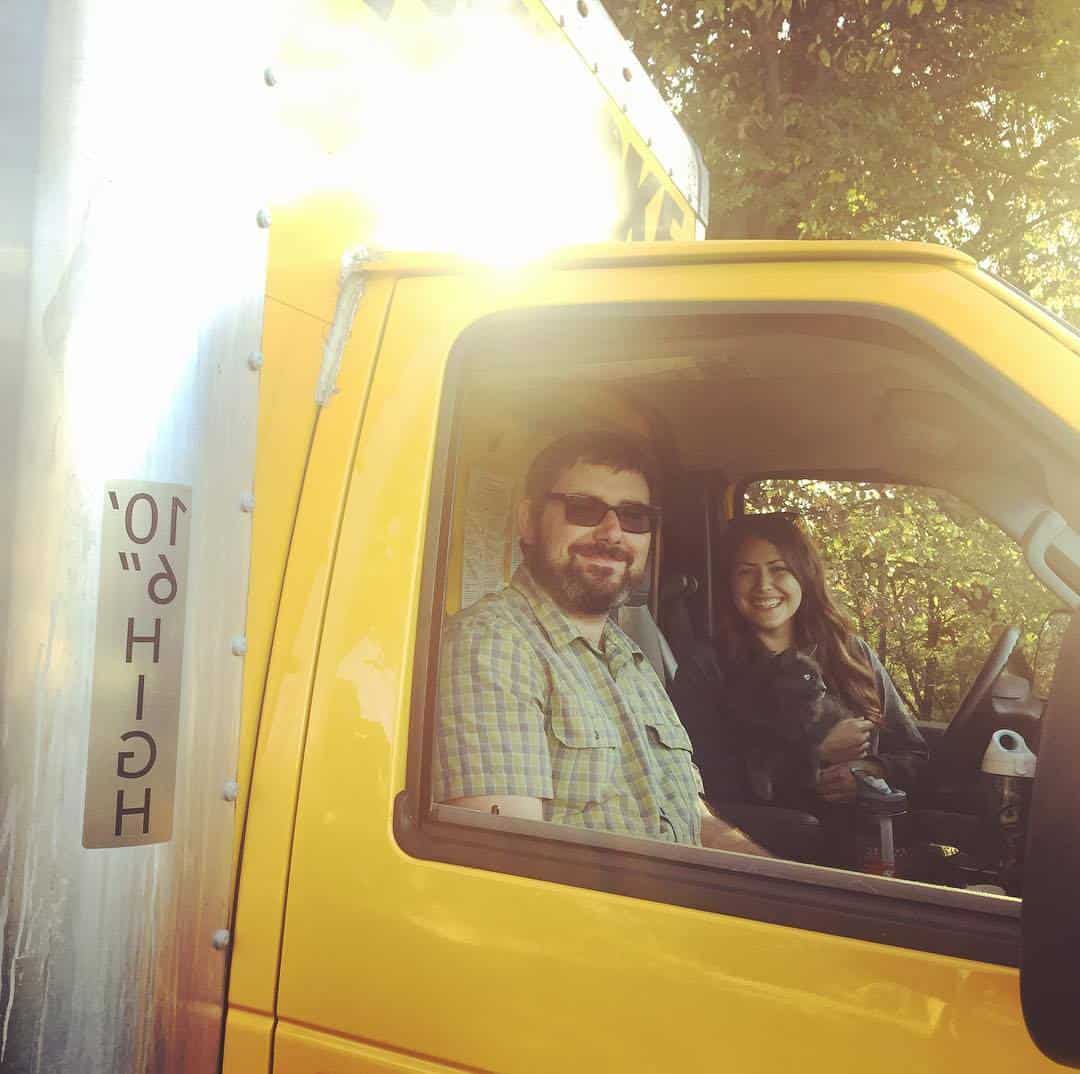
So, I just want to clarify there’s no fear or incapability here.
What it boils down to is Barrett’s anxiety. He’s supposedly less stressed if he has his hands on the wheel. I’m not entirely convinced, but I’m also not going to argue with him. So here we are!
Additionally, I am our duo’s planner and navigator. If we were on a smooth highway for the day, I would attempt to catch up on emails and writing on travel days. Eventually, though, I learned to avoid scheduling work for travel days because travel is stressful enough.
I will say that if you’re a nervous driver, try to find a way to get some time behind the wheel. If you’re ever in an emergency situation where one person cannot drive, you may find yourself needing to do so.
42. How do you grocery shop and cook?
I’m guessing the same way you do, for the most part!
There are a couple of notable changes: no more Costco runs. There’s just no room for bulk item storage.
Furthermore, we’re always in different grocery stores. So we often have to get used to varying layouts and different versions of the foods we’ve fallen in love with in other towns.
Barrett is the cook in the family (thank goodness for him)! He prepares most of our meals in four-serving batches, so he doesn’t feel like he’s cooking all the time.
Also, now that we’re moving a bit slower, we’ve really started to embrace Hungryroot. The meals are stupid easy to make, and healthy. We just have to pick out meals once a week and then pick up the box from the park office once a week!
43. Do you guys eat out all the time?
We sure don’t! I’m frugal AF.
However, in 2019, we ate out more than I would have liked. So, in 2020, we focused on spending less—and succeeded! Last year, we spent 40% less on dining out than we did in 2019.
Since 2019, we’ve been working on balancing reigning it in and making sure we enjoy each new place we visit.
If eating out is important to you, I’d just make sure you budget appropriately for that cost.
44. Where do you wash your clothes?
Many RV parks (and even many campgrounds) have laundry rooms.
When they don’t or when we’re boondocking, laundromats can be found pretty much anywhere!
(Random piece of information: Did you know laundromats can be spelled in all sorts of crazy ways? We’ve seen: laundrymat, laundry mat, laundramat, and launderette all while on the road!)
If you’re good at planning out a capsule wardrobe, you’ll be in great shape in RV life because less clothing makes everything easier. But you will have to do laundry a bit more often.
Moreover, some full-timers do have washers! We actually have the hookups for a washer in our rig, but we have never used it.
And then some full-timers use small portable washers like this one.
45. Are you afraid when you’re boondocking?
I like to joke that it took almost two years to convince Barrett to live in an RV and then nearly another two to convince him to boondock.
Many online resources help make boondocking “less scary,” including resources on Campendium, the Dryt, and Boondockers Welcome.
Do your research before picking a spot, and then protect yourself and your family with whatever materials are appropriate. Furthermore, be aware that boondocking requires more work and more attention. You will have to be more aware of your power usage, water levels, and tank levels.
46. How long do full-time RVers typically stay in one location?
The pace of full-time RV living is entirely up to the full-timers! In our first two-plus years on the road, we moved a LOT!
In the fall of 2018, we hightailed it out of the Pennsylvania chill straight to warm, sunny Florida days.
When we started, we were moving at least every week. The pace of travel was fast. And it was exciting.
In 2019, we stayed in 41 spots in 17 states. We followed the 70-degree days all year, visiting a combination of cities and the great outdoors.
Obviously, like everyone else, we thought 2020 would look a lot different than it turned out. We had a whole plan to stay south for winter, see friends in Utah, and so on.
In the spring of that year, we stayed in place in Arizona while trying to figure out what was going on in the world. A few mechanical breakdowns also caused us to stay put in a few spots longer than we intended. When we could move, we mostly spent the year hiding out in the wilderness.
In 2020, we stayed in 48 spots in 20 states.
In 2021, almost three years later, we were a bit worn out. We only parked in four spots! We realized that constantly moving was taking a toll, and we needed to move at a slower pace for a while.
We enjoyed planting the RV in a zone with tons of day trip opportunities in all directions.
Another reason we moved so much less that year was that we had started to hone in on an area we really loved, and we were discovering that we’d like to plant some roots in that area before once again taking off on more adventures!
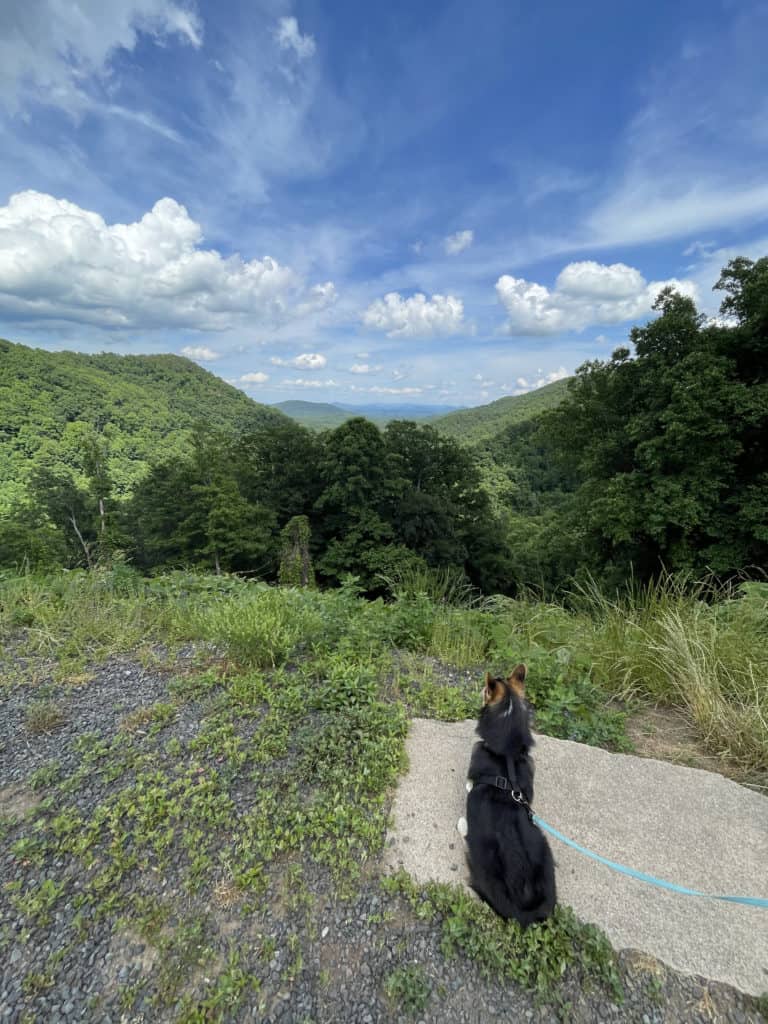
47. How long will you be living full-time in your RV? And how is your search for a place to settle down going?
At the end of this experience, I concluded that I’ll never be comfortable in one place. There are so many different and unique places depending on your preferences and the time of year.
I will always want to escape certain seasons, discover all the new hidden gems in every new Locals Know Best podcast episode, and visit my favorite people worldwide!
So, we will always travel and always RV, but I don’t believe it will always be full-time RV traveling.
After almost three years of living out of our tin can, we started to feel ready to return to the idea of a home with a tiny bit more space that doesn’t move.
Currently, I enjoy having a home base to which we can return, decompress, unpack, get work done, and prepare for our upcoming adventures. A place where we can RELAX.
After living in the RV, we became home-based in Asheville, NC, and hiked the entire Appalachian Trail in 2022.
As for future travels, we often chat about future truck camper or travel trailer excursions we want to take with our daughter and explore beautiful international destinations!
48. Will you guys have kids and continue to RV?
About kids: We added our beautiful daughter to our family in 2024!
About RVing with kids: Every kid we ever met on the road was incredible! We’re convinced of road schooling’s effectiveness.
49. “When are you going to return to the “real world”?”
Man, I hate this question. And if you ask it, you better be ready for a long-winded response.
I do not believe there is a “real world.” Every day, this world is what we wake up and make of it.
There, of course, is a societal “real world” in which we are raised. But it’s just that, what we were raised in. If full-time RVing is your dream, don’t deny yourself your dream life. Make it happen as soon as possible.
As George Strait and Huey Lewis and the News like to say: We’re Not Here For A Long Time, We’re Here For A Good Time.
50. Do we have any regrets about living in an RV full-time?
We got asked this a lot on the road.
I try really hard to not live with regrets. And what’s to regret about traveling around this great nation full-time?
But after really taking a moment to think about it, the only regret I could come up with was the purchase of our original GMC truck. But when we took off, it was the best we could afford, and the honest truth is, it still did get us around for over a year.
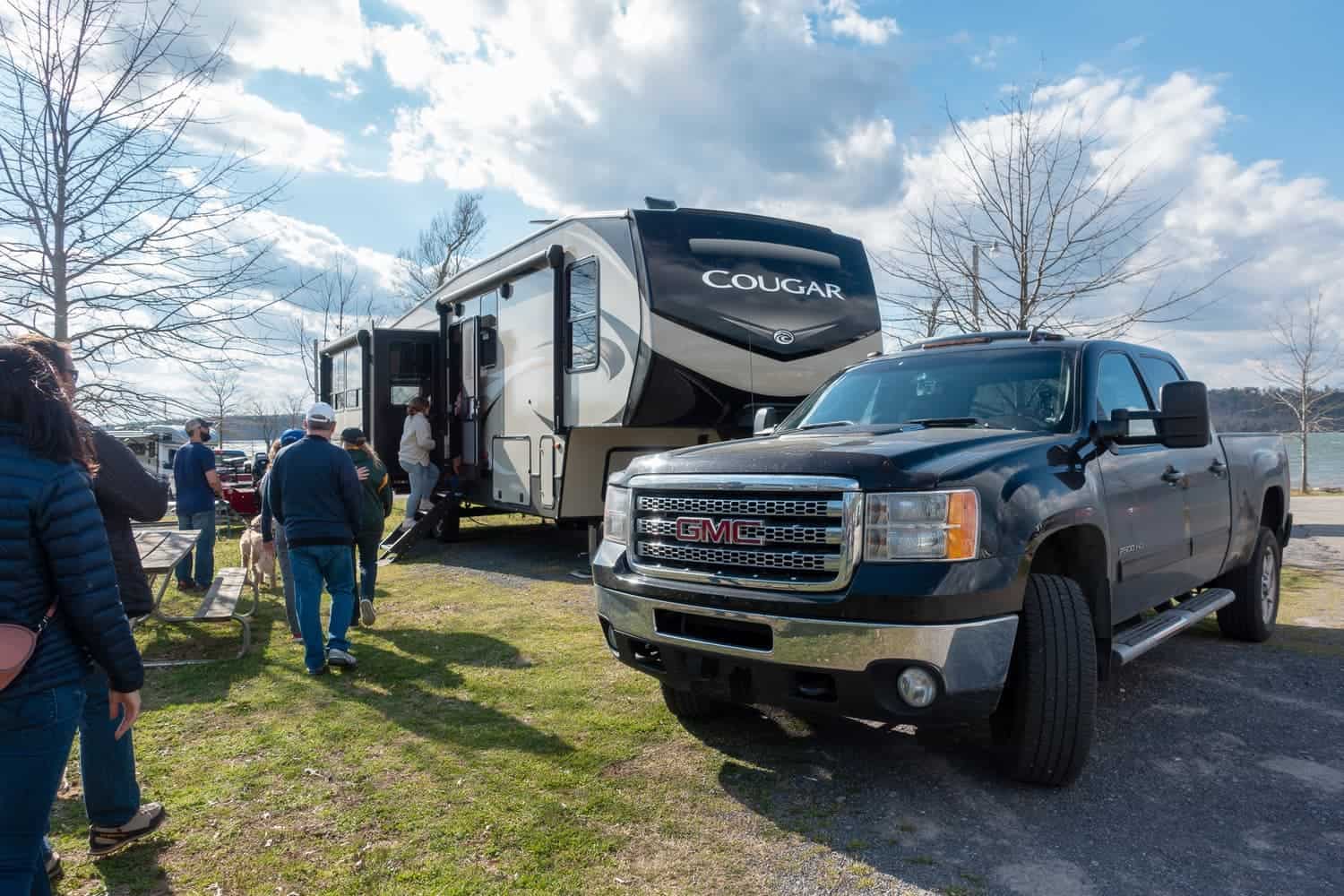
Now, in retrospect, though, I think we’ll always buy new when it comes to something as significant as the safety of getting our entire home and family around.
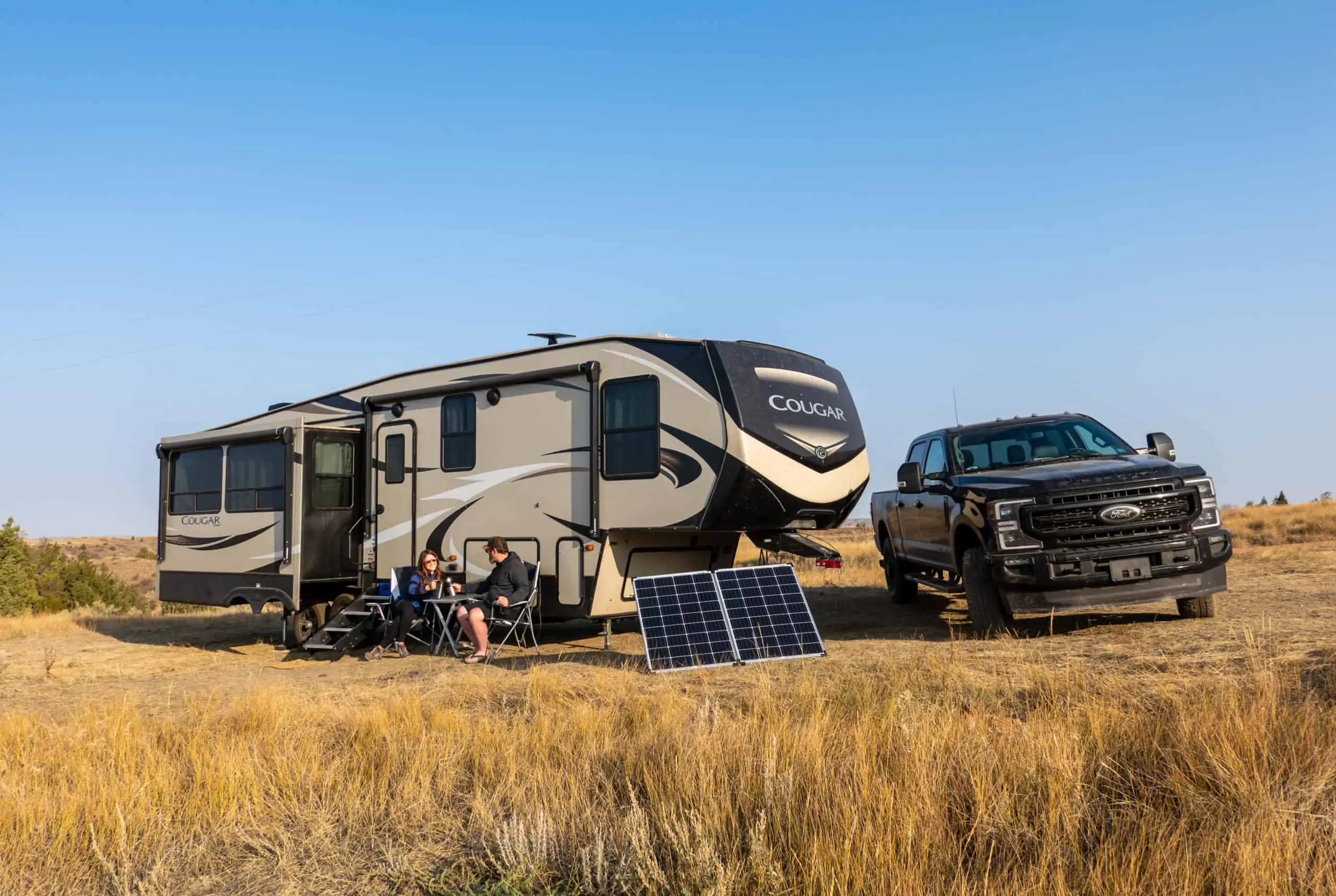
The problems with the original truck, along with the poor customer support at GMC, made for our most challenging period of RV life, which I would wish upon no one.
51. My family and friends tell me RV living is impossible. Can I really do this?
People placing their narrow-minded thoughts on others is my #1 pet peeve.
Don’t get discouraged if you’ve lived in a pretty stereotypical form of American society. Often, friends and family just want to look out for our best interests, but sadly, they don’t always have the right approach.
Everyone has opinions and will want to tell you ALL about them.
But RV life really is possible! We are real people. We lived this way for three years.
Also, RVing is becoming increasingly “normal” every day. A lot has already changed since we first started living in an RV full-time.
More people than ever have decided that they want to find out what it is like for themselves by living full-time as RVers. While this type of life isn’t perfect for everyone, those who take the plunge have one thing in common: They love to travel!
For us, adventures have happened, places have been visited, and relationships have been created with people all across the country who we probably never would’ve met otherwise!
I’ll leave you with this David Allen quote: “You can do anything, but not everything.” I think it’s one to live by.
What do YOU want? What is your anything? Ask yourself every day.
You can live in so many different ways. How do you want to spend your time on this planet?
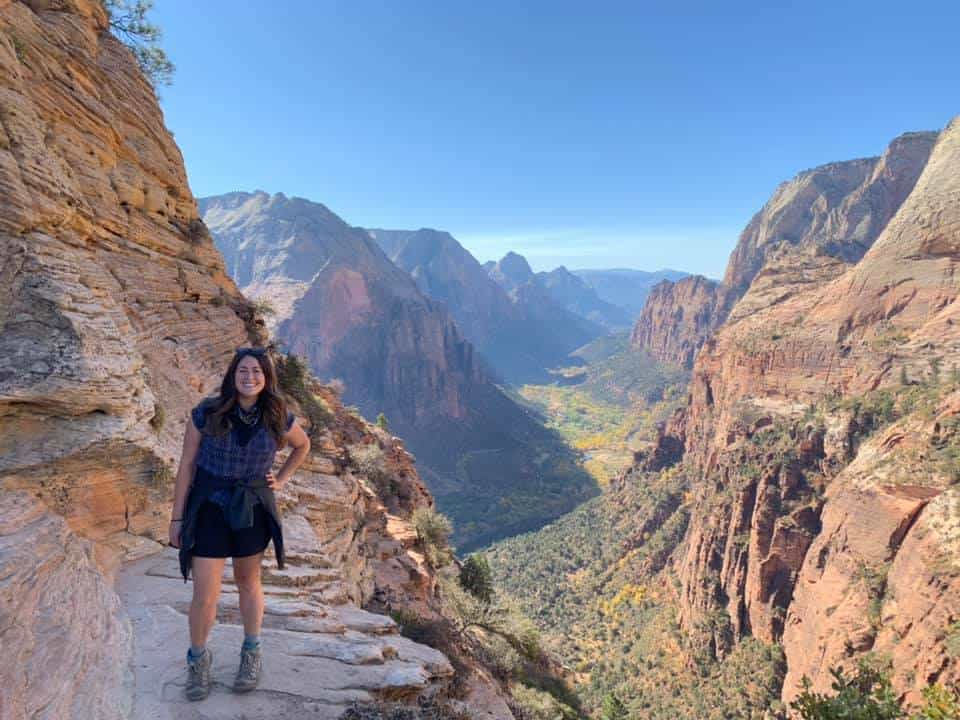
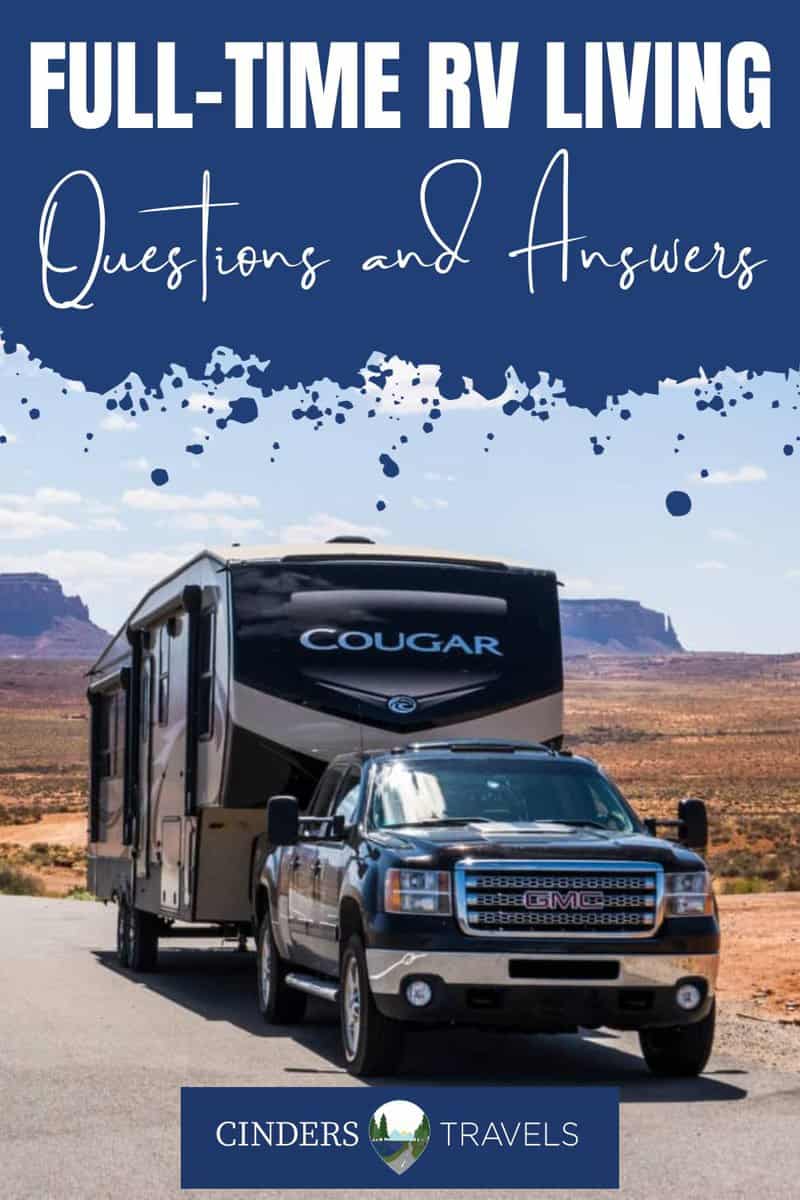
- Hiking the Appalachian Trail: Week 9 – Grayson Highlands Ponies & Longhorns - November 30, 2025
- Appalachian Trail Hike Week 8: Roan Highlands, Rain, & Renewed Motivation - October 22, 2025
- Ultimate Guide: 60+ National Parks Gifts for Park Lovers of Every Age - October 11, 2025

